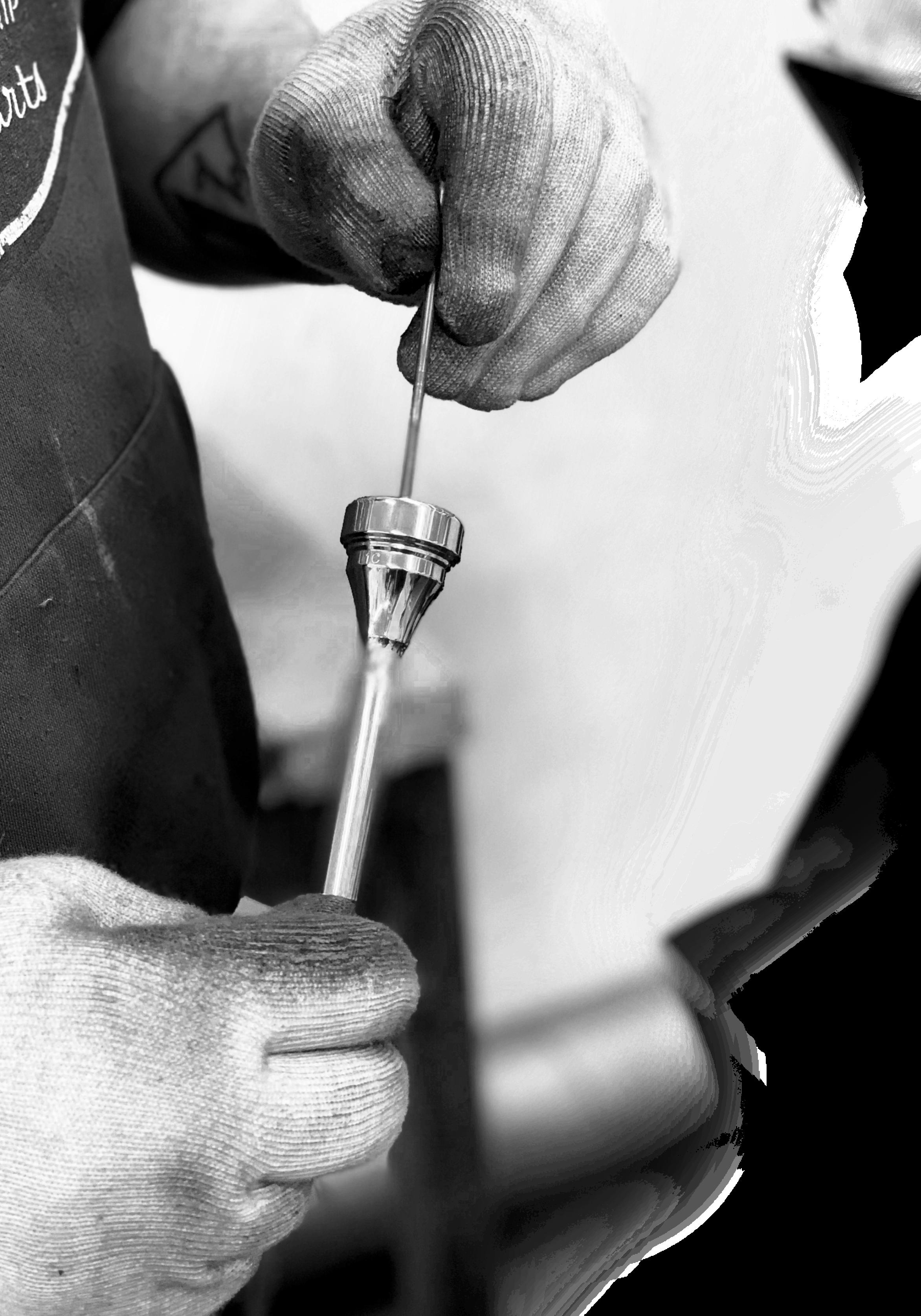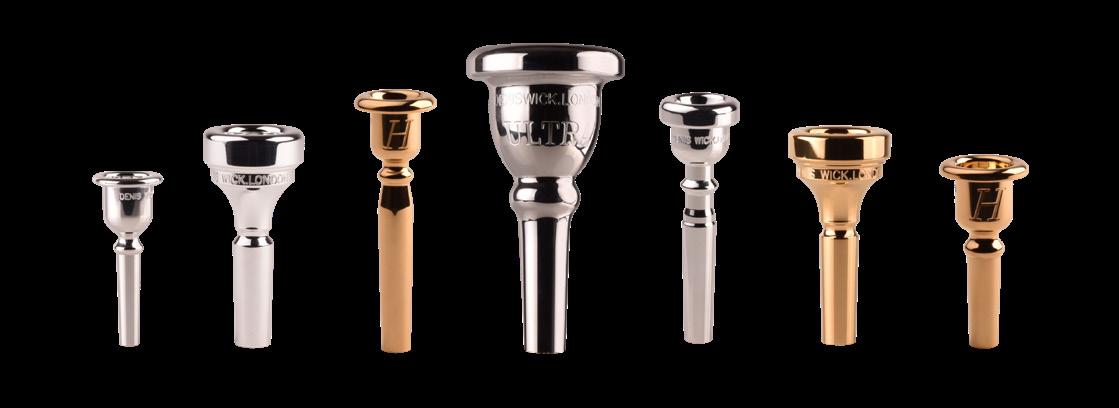










There is plenty on offer to members of the British Trombone Society. You will gain free or discounted entry to our events and access to bonus online content including recordings and our exclusive music library. We have teamed up with a variety of companies who offer exclusive discounts to our members.
This magazine, The Trombonist, is a central part of our membership package and is published three times a year, celebrating the variety of trombone related news and activity across the world.
Membership starts at just £10 a year, with a handful of options for you to choose from. Sign up online, HERE.
Gramophone – claim your 10% discount on subscriptions.
International Trombone Association – special membership rate of £21.
Jazzwise, Europe's leading English language Jazz magazine – 10% discount on subscriptions.
Allianz Musical Insurance – 15% off a new policy for our members – (that's more discount than with an MU membership!)
New Moon Insurance – one month discount on specialist Trombone and musical instrument ‘Harmonic’ insurance products.
Michael Rath – discount of 15% on all trombone repairs and servicing. Jürgen Voigt Brass – discount of 15% on all trombone repairs and servicing
Hearing ReSolutions – 10% discount on RRP's for protection products.
Warwick Music – 10% discount on all Warwick Music publications purchased directly from Warwick Music.
Minchin Music – £2 off the list price of ‘Tune In To Tenor’ tutorial book.
June Emerson Wind Music – 10% discount on online purchases
Hercules Stands – 50% discount on the retail price of all Hercules Stands products.
Rates
Regular £28
Concession £22 *
Under 16 £10
Institutional £99
Lifetime £250
*Available to students in full-time education, those retired and for seniors aged 65 and over
Access to our Members’ Music Library which includes arrangements and transcriptions by Burt Rhodes and Rob Egerton Jazz Transcriptions, plus our library of trombone choir and ensemble arrangements for use at your event (see conditions of use in the respective libraries).
Morrison Ward Associates –specialist mortgage advisors.
Image 1st – a generous discount worth £50 to use with this London based photography company.
Q-Park – an additional 10% off prebooking discounted rates in car parks across the UK.
Donating through Gift Aid means charities can claim an extra 25p for every £1 you give. It won’t cost you any extra. To make your declaration, log on and amend your profile on our website, download a declaration form and send to the Administrator or simply send an email to the same address requesting the check box(s) to be ticked for you.
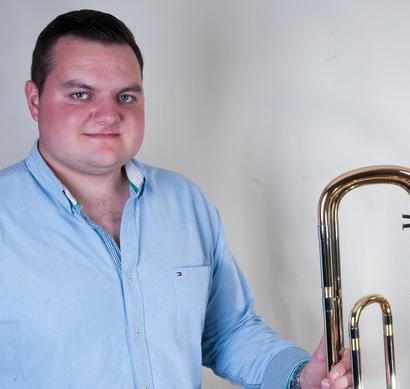
SIMON MINSHALL
A very warm welcome to this edition, though a sad one for me. After 15 years fulfilling a variety of roles as a committee member, my three years as President are up and it's now appropriate for someone else to invest their energy and dedication into this rewarding role. I am looking forward to attending BTS events as a member, and I am sure I will be involved at a committee level again in the future, but for now I would like to spend some more time with my young family and tackle some new projects. Thank you to all the Committee who have, over the years, put up with my odd ideas and helped steer these in the right direction to benefit you, the members of the Society. I would like to give special thanks to my great friend Jon Stokes who has been a superb Vice-President. I am so very proud of the position the BTS is in, long may it continue. Attending Peter Gane’s funeral recently, I was reminded of just what a positive impact the Society has had on our community.
On behalf of the BTS, I would like to take this opportunity to thank North West representative Kyle MacCorquodale for his contribution to the Society, as he steps down. Any members who would like to take over as the region’s representative, please get in touch!
I hope to see many of you at the British Trombone Festival. I must say, more workload and moving parts than a wedding! We hope we have catered for as many of you as possible, and congratulations to our competition finalists – I can't wait to be inspired by you all.
I'll see you in the next edition for a bit of a Festival roundup, but until then, please take advantage of all the resources the BTS has to offer.

ALASTAIR WARREN
Welcome to the Summer 2024 issue of The Trombonist, an edition filled with inspiration and celebration.
Firstly, we pay our respects to Peter Gane, a true inspiration for so many, not just within the trombone community, but also across the wider musical family of both the UK and Europe.
In April, Nathaniel Dye ran the London Marathon while playing the trombone, with stage four bowel cancer and a colostomy bag. Currently walking from John O’Groats to Lands’ End, he tells us of his determination to continue to live life to the full.
2024 marks Bones Apart Trombone Quartet’s 25th birthday; we join them as they celebrate. We also feature the winners of the BTS Composers’ Competition 2024, and Adrian France, director of the Concert Trombone Quartette, discusses Bruckner and the trombone ahead of a series of concerts celebrating Bruckner@200.
Building up to the big event of the Autumn, we preview the British Trombone Festival 2024. Simon Wills reflects on his experience participating at the recent International Trombone Festival and Peter Chester reports on his trip to the Slide Factory Trombone Festival, and a memorable BTS North East Trombone Day.
Elsewhere we review Emily White’s new album inspired by the human voice and talk to James Buckle about his experience of recording Kenneth Fuchs’ Bass Trombone Concerto.
Looking ahead to 2025, the BTS will be celebrating its 40th anniversary. Across the year we will be delving into the BTS archives, but we would like to include memories from BTS members in the pages of The Trombonist too. If you have any stories or images you would like to share, please get in touch.
Simon Minshall president@britishtrombonesociety.org
Alastair Warren editor@britishtrombonesociety.org
THE TROMBONIST MAGAZINE TEAM
EDITOR
Alastair Warren editor@britishtrombonesociety.org
SUB-EDITORS
Peter Chester and Alison Keep
NEWS EDITOR news@britishtrombonesociety.org
EVENTS EDITOR events@britishtrombonesociety.org
REVIEWS EDITOR
Jane Salmon reviews@britishtrombonesociety.org
ADVERTISING MANAGER
Chris Valentine advertising@britishtrombonesociety.org
SOCIAL MEDIA MANAGER
Martin Lee Thompson content@britishtrombonesociety.org
MAGAZINE DESIGN
Sára Mikkelsen saramikkelsen.com
FRONT COVER
B ones Apart
Photo credit: Jon Cox
CONTRIBUTORS TO THIS ISSUE
Alastair Warren
Becky Smith
Peter Chester
Simon Wills
Nathaniel Dye
Simon Minshall
Tom Pilsbury
James Buckle
Alan Swain
Josh Cirtina



Rupert Whitehead joins Royal College of Music
The RCM has announced Rupert Whitehead as one of three additions joining the Brass Faculty from September 2024, along with horn player Zoë Tweed and trumpeter Christian Barraclough.
Rupert joined the Royal Philharmonic Orchestra in 2022, performing regularly across the world and actively engaging with their Community and Education department, RPO Resound. He also serves as a BTS Committee member.
The BTS has teamed up with Rockschool to provide an outlet from which to obtain Rockschool Publications; every purchase will attract a contribution to BTS funds. Rockschool music qualifications are tailor-made for the contemporary musician. Ranging from introductory grades to advanced levels of study, RSL Awards graded music exams ensure hard work is rewarded. For over 30 years Rockschool has been producing materials to help people learn musical instruments and assess their progress. Visit the BTS Shop today!
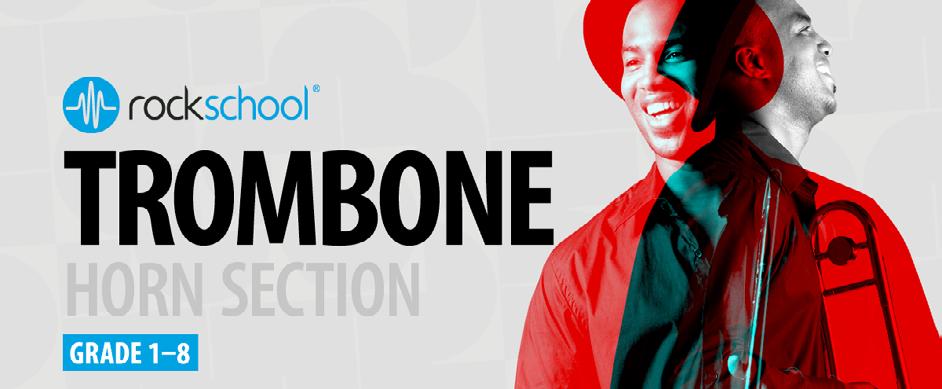
American bass trombonist Jennifer Wharton has been named jazz trombone rising star in DownBeat magazine’s 72nd Critic’s Poll. Congratulations also go to the UK’s own Rosie Turton, who was recognised on the critics long list.
Kris Garfitt will be stepping down from his position as Solo Trombone with the WDR Symphonieorchester having been appointed as the new professor of trombone at the University of Music, Trossingen. Kris commented, ‘[I am] especially humbled to be the successor of Abbie Conant, a wonderful artist with a huge heart, and one of our music industry’s heroes.’
Kris becomes one of an increasing number of British trombonists to hold teaching positions at major institutions across mainland Europe.
The International Trombone Association has awarded Abbie Conant the 2024 Neil Humfeld Award. The Neil Humfeld award recognises one teacher each year who has demonstrated an exceptional level of excellence in their work.
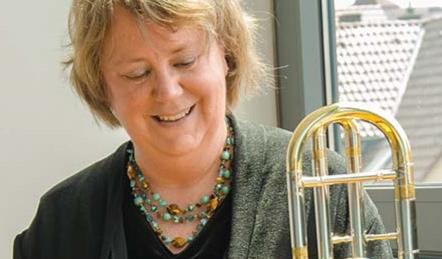
On Thursday, 5 December the BBC National Orchestra of Wales will give the world première of Simon Wills’ Nora Barnacle Assumes Command. Written for BBC NOW Principal Trombone Donal Bannister, the work is described by the composer as a Ballet Concertante for large orchestra with solo trombone, inspired by the
writings of James Joyce. For those unable to make it to Cardiff the concert will be broadcast live on BBC Radio 3. Look out for an in-depth exploration of this major new work in the Winter '24 edition of The Trombonist
Major Concerto Performances
Spring 2024 saw several major concerto performances around the UK. Royal Philharmonic Orchestra Principal Trombone, Matt Gee, performed Tomasi’s concerto with his orchestra; Blair Sinclair, Principal Trombone of Opera North, performed Rota’s Concerto and Leopold Mozart’s Alto Trombone Concerto accompanied by the Sinfonia of Leeds; Helen Vollam, Principal Trombone of the BBC Symphony Orchestra joined the National Youth Concert Band for Kirkfeld, composed by BAFTAnominated composer, Grant Kirkhope, and Jamie Tweed platformed the rarely performed concerto by African American jazz pianist, composer and arranger Phil Moore during the Royal College of Music FestivALL. The work, written in collaboration with American conductor and composer Nathaniel Shilkret, was recorded as one of the first pressings of the record label Discovery.
Jay Freidman Retires
Chicago Symphony Orchestra Principal Trombone Jay Friedman has, at the age of 85, announced his retirement from the orchestra after a truly remarkable 63 years. Read more about the legendary CSO low brass section in this article from the Summer '21 edition of The Trombonist.
Orchestral Manoeuvres
In April, Joe Arnold was appointed Principal Bass Trombone with the Bournemouth Symphony Orchestra, leaving the same position with the Orchestra of English National Opera, and Dafydd Thomas has recently taken up the position of Second Trombone with the BBC National Orchestra of Wales, moving from the same position with the Orchestra of Welsh National Opera.
Peter Moore flying solo 10 years after becoming the youngest ever member of the London Symphony Orchestra Peter Moore has stepped down from his position as Principal Trombone to focus on his activities as a soloist. He remains a Professor at the Royal Academy of Music. Peter recently launched a new series of online Deep Dive Masterclasses, featuring David’s Concertino in the first edition.
New Appointment at Foden’s
Oliver Webb has been appointed as the new Second Trombone of Foden's Band. A student at the Royal Northern College of Music, Oliver is a former longserving member of both Lions Youth Brass and Foden's Youth Band and most recently held the Principal Trombone seat with Championship Section Pemberton Old Wigan DW Band, helping the band secure qualification to the National Finals.
Christian Jones Launches New Project
Christian Jones has launched The Circus Suite, a suite of nine programmatic pieces for bass trombone, tuned percussion, piano and drums composed by Mark Travers, designed to inspire the next generation of bass trombone players. Premièred in June across four schools, the suite has already been heard by over 1,000 primary school children.
Set in the world of the circus, these pieces explore the versatility of the bass trombone and bring it to life, from the high-wire dexterity of the trapezist and the roaring majesty of the lions, to the comedy of the clowns and welcoming theatricality of the Ringmaster.
Listen to The Circus Suite here
The BTS was sad to learn that bass trombonist Ron Bryans passed away in the Spring. Ron was a highly successful player, held in high esteem by his colleagues. He worked with all the major British symphony orchestras, Ballet Rambert, on countless film and TV sessions and with period instrument ensembles such as the Consort of Musicke and New London Consort. He was also a Professor at GSMD. His story took an unexpected turn when he was diagnosed with retromolar and tonsillar squamous cell carcinoma in 2006, the treatment of which led him to develop facial palsy, which you can read about in his own words here. Despite the many challenges Ron faced, he maintained his sense of humour and appetite for life.
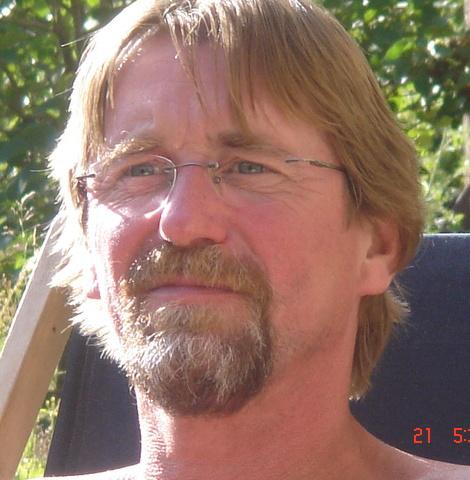
Wells Cathedral School will be hosting Ian Bousfield for a masterclass and recital on Thursday, 5 November. The BTS are supporting the event; members will be able to attend the masterclass for free and will also get a £5 discount on tickets for the evening recital. There will also be an exciting opportunity for a young trombonist to win a chance to play in the masterclass with Ian. ◆
BY ALASTAIR WARREN
Peter Gane passed away in July at the age of 76. Born in 1948 in Poole, Dorset, at the age of 16 he won an open scholarship to the then Royal Manchester College of Music and in 1968, at just 19, became a member of the London Symphony Orchestra Trombone section; he left the orchestra in 1972 having risen to Assistant Principal. In a short playing career, Peter also performed with other major orchestras such as the Bournemouth Symphony Orchestra, the Hallé and the London Philharmonic Orchestra, and performed and recorded with the Philip Jones Brass Ensemble, before dedicating himself to education, a field in which he become one of the most influential figures of the last 50 years.
Peter was presented with the Neill Humfield Award for excellence in trombone teaching by the International Trombone Association in 1996, and the BTS outstanding contribution award in 2013.
Guildhall School of Music and Drama
Peter became a professor at the Guildhall School of Music and Drama (GSMD) in 1971, was elected a Fellow of the School in 1981 and was Head of the Wind, Brass and Percussion department from 1988 to 2008. After stepping down, he continued to contribute to the specialist brass and wind programmes at GSMD and remained a professor within the department. As a teacher, brass specialist and conductor, Peter took masterclasses and workshops in many European conservatoires and with professional groups in Germany, France, Denmark, Sweden, Norway, Spain, Holland, Austria, Italy and the US. He was also an Artistic Adviser to the Combret Music Festival, Aveyron, France.
Professor Jonathan Vaughan, Principal of GSMD, writes:
‘The passing of Peter Gane marks a profound loss for the Guildhall School community. He was an inspiring and visionary leader, guiding the Wind, Brass and Percussion Department with unwavering passion and dedication.
My admiration for Peter began when we first worked together at the National Youth Orchestra (NYO). I fondly remember the early morning warm-ups he created, which he whimsically named the ‘Wibbly Wobblies’. It was Peter who encouraged me to apply for the Director of Music position at Guildhall, a suggestion that was to significantly shape my career.
His legacy spans 50 years, influencing generations of NYO and Guildhall students, many of whom owe their careers to his teaching and guidance. Generous to a fault, Peter’s every lesson and conversation was accompanied by his signature beaming smile. He was a Guildhall legend, and we will all deeply miss him.’
Professor Eric Crees paid this tribute:
‘I first met Peter as an audience member after an LSO concert in 1969 and was immediately struck by his forthright, positive manner and immense energy. That he had joined the LSO at the age of only 19 came as no surprise to me!
Our next encounter was playing second trombone to him in a Bournemouth Symphony Orchestra Henry Wood Prom concert in, I think, 1972, when two players were off with illness, and we were both ‘deps’. Understandably more than a little awestruck, Peter made things very easy for me. He was so friendly; the sound quality was warm and direct; dynamics and
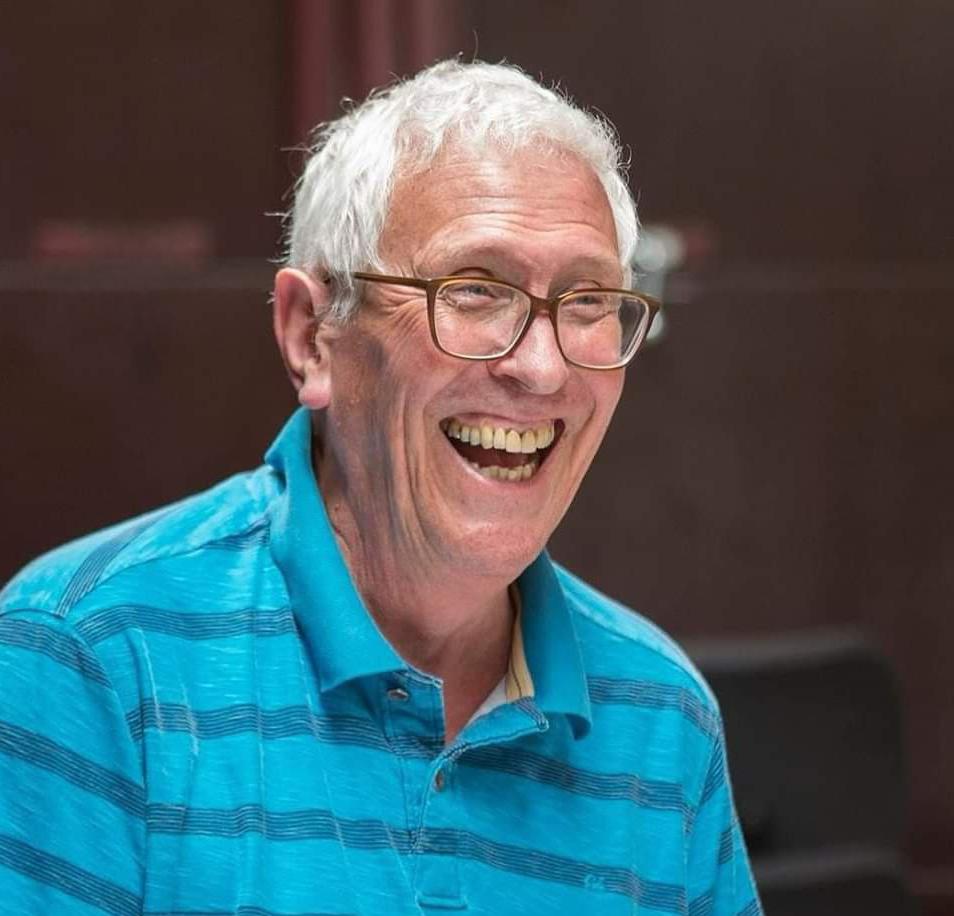
articulations were perfectly adhered to, and intonation was immaculate. This made things work so well in the section. But there was much more to him than that. The enthusiasm and enjoyment in his playing were palpable and were combined with an uncanny sense of an inner knowledge of the music and a completely appropriate style that comes only with the finest musicians – a total inspiration. And we spoke about music, not mouthpieces!
Peter fortunately invited me in to work beside him in the LSO in repertoire stretching from Scriabin’s magnificent Prometheus to jazz legend Ornette Coleman’s controversial Skies of America. What an apprenticeship!
When he had to stop playing, it came as a great shock, but with his resolve and determination he forged a new career as a teacher, coach and general musical educator. He is particularly remembered for his work
with the NYO and the European Union Youth Orchestra (EUYO). Trumpeter Alison Balsom said of her days in the EUYO that she played 'for Peter' above anything else.
We became close friends and I saw him regularly at the GSMD where he was a professor, and I was very much a teaching novice. Over a cup of tea, we started to discuss the problems that students had when playing legato and the lack of explanatory teaching material.
Peter suddenly said, ‘Let’s write a book together – we both think the same’ and so, How Trombonists Do It was born. We both agreed on a plan for the different sections and that our input should be completely equal.
One thing that was uppermost in our thinking was that the book must be about playing musically and expressively and not an endless series of ‘flexibilities’. It was all very relaxed and complementary and HTDI was soon finished. Peter went on to add more to the teaching literature and brought his own distinctive style
to several other distinguished books. [The nine videos that accompany Circuit Training for Trombone afford future generations a chance to learn from the man himself.]
His appointment as Head of Wind Brass and Percussion in 1998 was a superb one and for the next twenty years brought a new philosophy to an already fine department. There was a special emphasis on ensemble concerts, repertoire classes and chamber music. His remarkable ability to get the very best from his teaching team was an extraordinarily special gift.
I could write so much more about his fine attributes and skills, but it would be woefully insufficient. Peter Gane was a colossus in the fields of music and teaching, our world is hugely diminished by his passing.’
Peter played in the National Youth Orchestra as a teenager, and tutored its players for nearly 50 years, supporting young people in the most incredible ways. In 2009 he was acting director of the NYO for its acclaimed performances at the Aldeburgh Festival and the BBC Proms at the Royal Albert Hall.
Speaking at Peter’s funeral NYO CEO Sarah Alexander paid this tribute:
‘Peter was a consummate musician. Peter knew fundamentally that musical generosity can make wonderful things happen between people, quite literally out of thin air. In him the technical and human spirit of musical generosity were combined in a single musical vision, and a single huge grin.
Breath was everything for Peter, “put more air through the instrument and you’ll make it your own”, that was his big message to his many students, and he practised what he preached. He put air through the trombone, first of all as a precociously brilliant player headhunted to play first trombone for the LSO at the age of 19, where the first trumpet declared Peter’s was the best trombone playing he’d ever heard.
Later, Peter threw his pent-up musical energy wholeheartedly into teaching, mastering the art of putting air through the trombone without raising the instrument to his lips. We’ve just heard Sibelius Symphony No, 2. Peter loved that piece for the sense of pure air and space that just keeps on growing. It has the same theatricality of space and air that Peter himself carried into the room, a spaciousness that welcomed others to expand. Peter enjoyed nothing more than enabling young musicians to come into the infinite space for musical expression that he understood so well through their own playing, and that great big grin of his showed everyone in advance that he knew they could do it and the grin just kept on growing with their success, because what Peter heard and saw and said
was rooted in his purely positive energy. Peter never shied away from telling people hard truths, the tough part was just something you had to face, so you could get beyond it, into the space that’s created by your own breath. Peter was a courageous man, and when I first came to the National Youth Orchestra he supported me to be courageous too. People trusted him because of his integrity, his love of music and his will to help others … He didn’t use many words, his habit was to scan the room looking for good intentions, sizing people up, searching for something positive he could work with and if things were difficult, he responded with a twinkle and a joke, not telling people but showing them that everything was going to be OK. He channelled energy and the direction that seemed to him most likely to make something wonderful happen, and over and over again it did. Peter was astonishingly modest, he appeared to have no ego at all, while at the same time being quite able to fill the room with his own special energy. Peter was a unique man who relished the uniqueness of others.’
In 2012, Peter made a film with the NYO trombone section that showcases the teamwork, challenge and spirit of fun he brought to absolutely everything he did.
As brass tutor, Peter Gane coached generations in what was first the European Community Youth Orchestra and later the European Union Youth Orchestra.
Marshall Marcus, EUYO Executive & Artistic Director writes: ‘I first met Peter Gane in 2013, on my first project with the European Union Youth Orchestra. The breadth of his talents was amazing: a great expert on the trombone, but with a real twinkle. You could talk seriously with him and have a joke, he was a legend in the trombone world and he remained incredibly young at heart. He was an extraordinary person, and we will miss him dearly.’
Colin Window, EUYO Tour Manager, shared a memory typical of Peter’s inclusive approach:
‘The only time I ever played in any orchestra, never mind the EUYO, was under the baton of Peter Gane in an outdoor Brass Film Music Concert in Bolzano, probably 20 years ago. I thought he was joking when he said he wanted me to play, but he was serious. I’m not a musician at all.
And what did I play? From one of the upper windows of one of the buildings overlooking the square, I blew the police whistle in a West Side Story medley. From a massive distance he stared straight into my eyes and cued me on and off. I was terrified and exhilarated at the same time. I loved him for it.’
British Trombone Society
Peter was a driving force behind the foundation of the BTS in 1985; serving as the Society’s first President from 1986–89.
In an early President’s column, published in the Summer 1986 edition of The Trombonist, Peter set out something of his teaching philosophy, and one of the fundamental purposes of the Society: to encourage and nurture future generations.
‘Although billed as trombonists, our work will tend to identify us as musicians, performers and teachers. What the first two roles demand of us in our working life seems evident. Success is easily judged by more work – better work – even applause! Failure, the reverse. But what of our teaching? How do we know we are successful here? Number of grade 8 passes per square inch? Providing dewy-eyed starlets for higher music education? Encouraging children who enjoy their playing regardless of standard? Encouraging an elite of gifted children? As a Society we perhaps have an important duty to consider young people, future audiences and players as they are, and their musical needs … The definition of learning is to effect a change …’
Current BTS President Simon Minshall commented: ‘Peter was a real source of knowledge and so supportive of young players. I first met Peter on a NYO taster day. He was nothing but encouraging and kind. As our NYO trombone coach, he inspired and nurtured all around him.
Peter’s work in founding the BTS, serving as the Society’s first President, has left a legacy for all of us to enjoy and carry forward. Beyond that, he was just such a lovely man – he always greeted with a smile, never talked down to anyone, he exuded energy and enthusiasm, and tirelessly helped and supported whoever and whenever he could.’
Numerous tributes to Peter can be read on the BTS Facebook page, a selection of which are reproduced below.
‘I simply can’t think of anyone else who has had a more profoundly positive influence on a greater number of young musicians.’
Amos Miller – Head of Brass, RCM
‘I first met Peter in 1979 when I was 16 years old along with my fellow NYO cohort, and he subsequently took me under his wing, giving me private trombone lessons between the three annual orchestral courses Then followed the most significant 4 years of my life at the GSMD under Peter’s unwavering guidance. He was simply the best, not just as an inspirational teacher and mentor but as a kind and caring human being. He was
compassionate, witty and immensely intelligent, and he just knew how to express in words how to overcome any difficulties I was having with my playing … he didn’t subscribe to the ‘copy me’ style of teaching, he verbalised everything in the most articulate manner. He simply brought out the best of you in every lesson, and when things weren’t going so well then you absolutely knew where you had to focus your practice … thank you Peter for everything, you genuinely helped me become the person I am today and my gratitude to you is eternal.’
Adrian Lane
‘… He was the NYO tutor for me, then the reason I went to Guildhall. Our lessons were 9.00am on a Friday. We would sit chatting on a bench in the foyer with coffees, until he slapped his knees and went into teacher mode. [I] Can clearly picture him, singing along, sometimes dancing along, giving 100% positive energy in lessons. Then that huge smile, and away you went, with so much to think about!’
Roger Cutts – Principal Trombone WNO
‘Some years ago, Peter came down to his birthplace, Poole, to support a BTS event that we were helping with. As a teacher, decades earlier, he very patiently managed to help me find a way to understand how to play the trombone, and while running the BTS workshop that day it soon became clear that nearly everything I was trying to say I had learned from him, much to everyone’s amusement. Later, Robb Tooley performed Dan Jenkins Trombone Concerto, both past pupils of Peter’s and the performance was conducted by Kevin Smith – who was a member of ECYO (now EUYO) and tutored by Peter. As well as being such a positive influence on our lives as students he was still supporting us years later. A lovely person who will be greatly missed.’
Kevin Morgan – Principal Trombone BSO
‘What a legend. Do you remember his conducting? All knees and elbows.’
David Musk
The final tribute comes from Peter’s daughter, Susie, speaking at his funeral: ‘My father was kind, generous, gentle, positive, optimistic, determined, loyal, energetic, passionate, creative, unconventional, tank-like, free thinking, a loner, humble, stubborn, independent, always cheerful with a big toothy grin … and loud.’
As a lasting tribute to honour Peter’s legacy the BTS Teacher of the Year Award will henceforth be known as the Peter Gane Teacher of the Year Award. ◆
BY SIMON MINSHALL
The line-up for the British Trombone Festival 2024 is almost complete and a full schedule will be released in the Autumn, but here is a taste of what is in store to whet your appetite.
On Saturday, 26 October artists include Josh Cirtina, launching Shire’s Vintage bass trombone, Callum Au leading a class exploring big band section playing and Chris Augustine focussing on the skills required to play in West End shows. Richard Watkins will make his BTF debut.
The early evening Showcase Concert will provide an opportunity for all delegates to perform pieces rehearsed in the morning massed blow and see the première of the BTS Composers’ Competition 2024 winning composition.
The concert concludes with a set from the Royal Birmingham Conservatoire Jazz Orchestra, led by Jeremy Price with special guest, star jazz trombonist Nils Wogram.
On Sunday, 27 October Bones Apart join us to celebrate their 25th anniversary, Emily White will première Alex Paxton’s Apocalypse Flower for solo sackbut and Nils Wogram will be in residence. In addition, both Peter Moore and the RAF trombone ensemble will make return appearances at the BTF.
The closing Gala Concert features Bones Apart, Peter Moore and Josh Cirtina, accompanied by the Royal Birmingham Conservatoire Brass Band, conducted by Ian Porthouse.
Keeping with tradition, both days start with a warmup and massed blow led by Festival artists and ‘Lesson lotto’ will be in operation across the weekend,
giving participants the chance to receive a lesson from one of the Festival artists; exactly who will be a surprise until you open the door!
Many of our sponsors will have trade stands for you to explore. They include pBone/pBuzz, Denis Wick, John Packer, Michael Rath, Phil Parkers, Warwick Music Publishing, RSL, Hawkins Mutes, Prozone, World of Sound, Andy Clennell, and the RAF.
Book your BTF '24 place here.
Saturday night’s Jazz Evening is set to be a highlight of the weekend once again. This year features a triple bill, with sets from the Dave Sear Quintet, Brum Bones (Dave Sear, Tom Dunnett, Jeremy Price, Richard Foote, Lyndon Meredith), and headliner Nils Wogram.
The Jazz Evening is separate ticketed event. Demand for tickets is always high, don’t leave it until the last minute to book.
We have negotiated special room rates at the adjacent Marriott Aloft Birmingham Eastside Hotel for the Festival period. Click here to book your room(s).
Please note, the offer closes Friday, 20 September 2024.

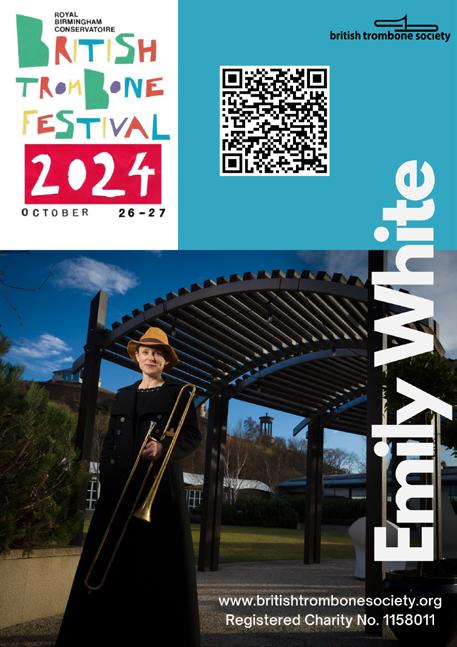
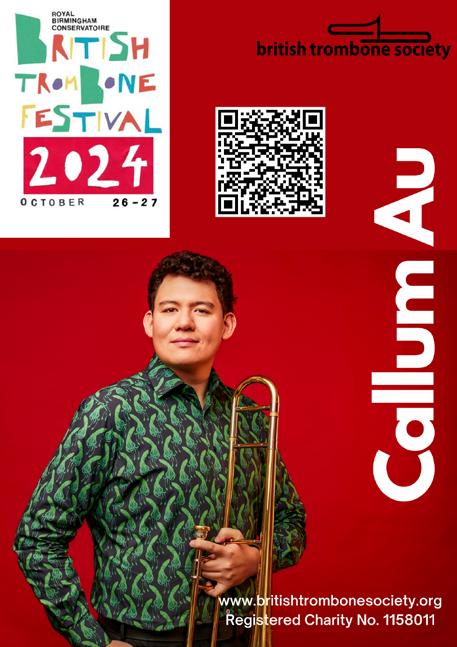
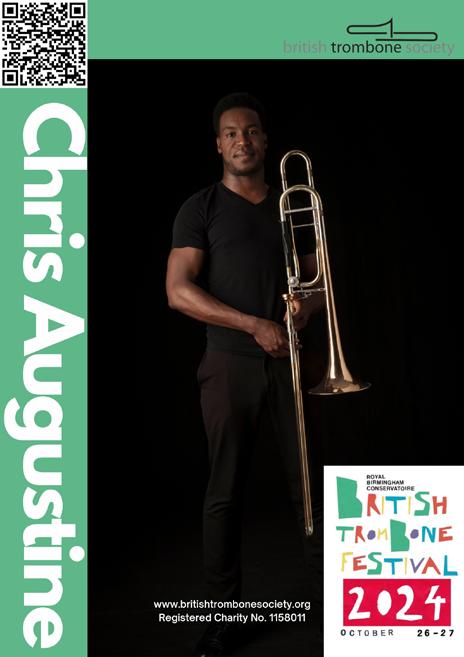

Since 2022, the BTF has been home to the finals of the BTS performance competitions. From more than 50 entries our judging panels have selected the following finalists, we look forward to welcoming them to Birmingham to showcase their skills.
BTS Trombone Quartet – Bones Apart Award
Slide by Slide
Adam Thomas
Rhodri Thomas
James Parkinson
Joe Smales
The Funny Bones
Amelia Lewis
Jack Myles
Miguel Zoco Sesma
Cameron Bahmaie
The Outsliders
Pau HernándezSantamaria
Robyn Anderson
Meggie Murphy
José Teixeira
Bob Hughes Bass Trombone Competition
Paul Rocamora
Joseph Smales
José Teixeira
BTS Alto Trombone Competition
James Druce
Jamie Reid
Milly Deerling
BTS Inter-Collegiate Trombone Choir Competition
Royal Conservatoire of Scotland
Royal College of Music
Guildhall School of Music and Drama
Trinity Laban
BTS Community Trombone Choir Competition
Belfast Trombone Band
South Coast Trombone Ensemble
BTS Sackbut Competition
Claire-Ombeline Muhlmeyer
Pau Hernández Santamaria
Jamie Reid
BY PETER CHESTER
For the BTS North East Trombone Day held on 19 May in Durham there was much flocking from foreign parts – the Isle of Wight, East Yorkshire, Liverpool, Scotland, West Yorkshire, Sunderland, the United States, and Venezuela, to name but a few
The sun was not quite as bright as we have had in past years but there was warmth and pleasure inside the venue for the doughty two dozen or so players who attended. Once again, we enjoyed the excellent facilities of the Mark Hillery Arts Centre of Collingwood College. Gatherings of trombone players like these serve many purposes, social and musical, even a chance to play that trombone that has hardly been touched for thirty years, but a central pleasure is always to listen to the wonderful range of styles of music in which the trombone can shine. That’s always something we try to achieve in compiling our programme and list of guest players. This year we were very pleased to welcome Dr. Brett Baker, whose achievements and contribution to the world of the trombone need no introduction. Alongside Brett we had Slideshow, a trombone quartet which had emerged from the Royal Conservatoire Scotland in Glasgow, and to complete our offering we were pleased to welcome Jason Holcomb, who behind the formal title of Head of Brass Studies at Newcastle University, is a very active performer, band leader, recording artist, and arranger, particularly in the Jazz, Latin-American and Afro-American fields. It was also our great pleasure once again to welcome as our accompanist David Murray, whose sympathetic playing has always been much appreciated by our guests. As ever, we opened the day with a massed blow, which Jason led with his natural enthusiasm. On his own admission he had not experienced the sound of such a choir since his college days back in the USA, and his enjoyment of it was evident from the start. Language differences – quarter notes or crotchets? – all added to the fun. We opened with Pastime with Good Company,
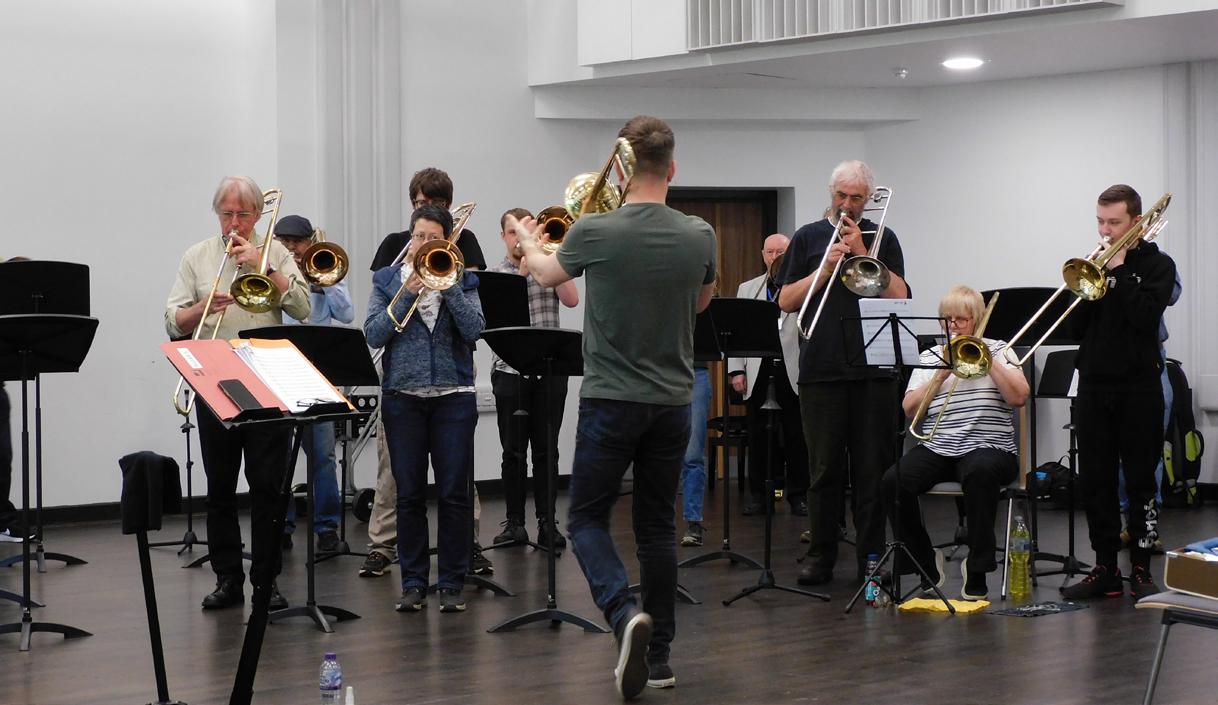
always a good starter, before moving to Carol Jarvis’s smooth close harmony arrangement of My Funny Valentine. Something new to almost everyone, the first movement of the Liten Svit by Christer Danielsson proved a delightful find, once we got the tempo right, and we finished with a decidedly percussive Uptown Funk, trickier than it looked, but worth working on the rhythms, something with which Jason was especially familiar and helpful.
The Slideshow Quartet took the first slot after lunch. Three members, Symone Hutchison, Joshua Parkhill, and Minkhai Khoo were recent graduates of RCS, and Emma Close is currently in her second year there. They have all been schooled by BTS stalwarts in Scotland, Simon Johnson and Dávur Juul Magnussen. Their recital opened with a sparkling rendition of Achieved is thy Glorious Work, from Haydn’s Creation,
a lovely demonstration of clear and clean ensemble playing. Next was a little suite of three pieces from the operatic world. First, an excerpt from Hansel and Gretel, notable for quiet and smooth playing in all registers, and second, two pieces from Bizet’s Carmen, the Aragonaise and the Habanera, by turns lively, elegant and rhythmical.
Taking turns, each member of the group introduced the music, and it was Malaysian-born bass trombonist Minkhai Khoo who told us about an atmospheric and
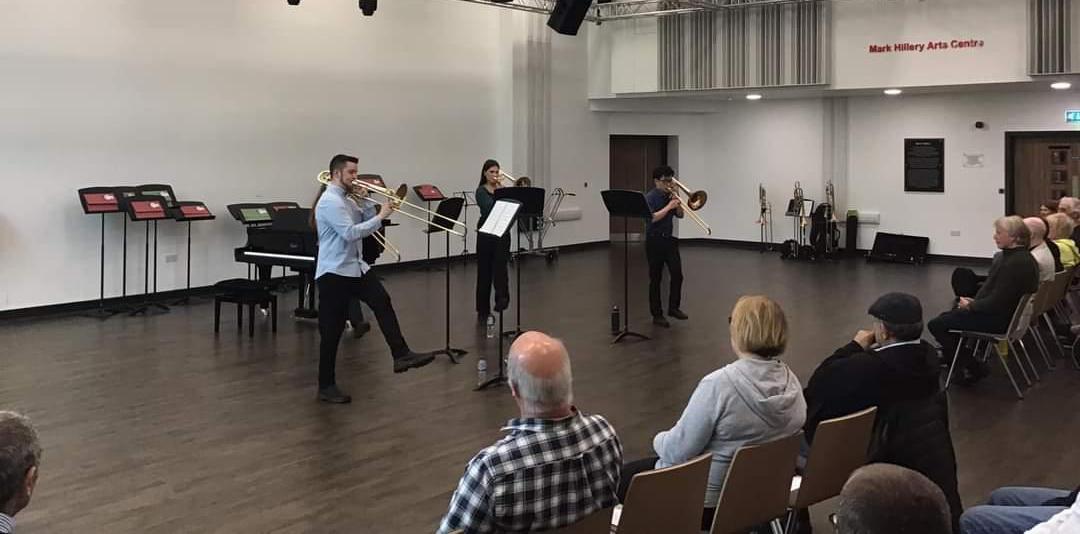
descriptive piece called City of Arts & Sciences, written by David Faleris. Although depicting the changing moods and contrasting quarters of Valencia in Spain, part of its inspiration was the daily commute between Edinburgh and Glasgow experienced by the composer. The music had real technical challenges and there was some lovely playing, with evocative dynamics and dramatic mood changes and of course it was all the more interesting to hear as it was a relatively new piece (2013) written especially for trombones.
In contrast, the quartet’s Georgia on my mind, was a beautifully smooth offering. Isabelle Daws, the young English trombonist recently appointed to the Luxembourg Philharmonic, provided the group with a wonderful arrangement of what might be called the ‘best bits’ of the famous Concertino by Ferdinand David. This blended the trombone line and the piano part, as well as extracts from other music, even the Ride of the Valkyries (!), to produce a clever and demanding piece, perhaps poking gentle fun at the original. The quartet’s excellent rendition certainly brought smiles of appreciation from the audience. Piazzolla’s Libertango and a homage to Frank Sinatra, a swinging New York, New York, complete with co-ordinated footwork, took us almost to the end of their varied and very entertaining programme. The final piece just had to be Scottish and it was a beautifully evocative arrangement of Loch Lomond, played with an ease and warmth of sound that can send shivers up the spine. The audience loved it.
And so, to the masterclass we must of course record our sincere thanks to our two volunteers, Andrew
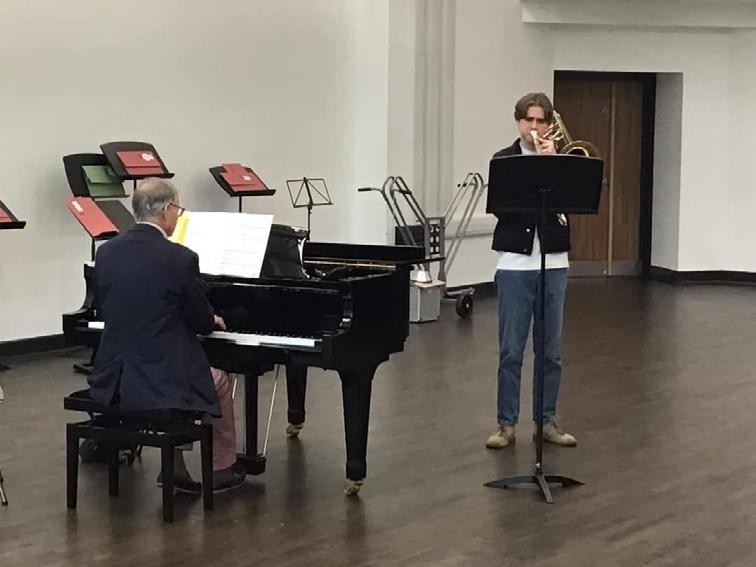
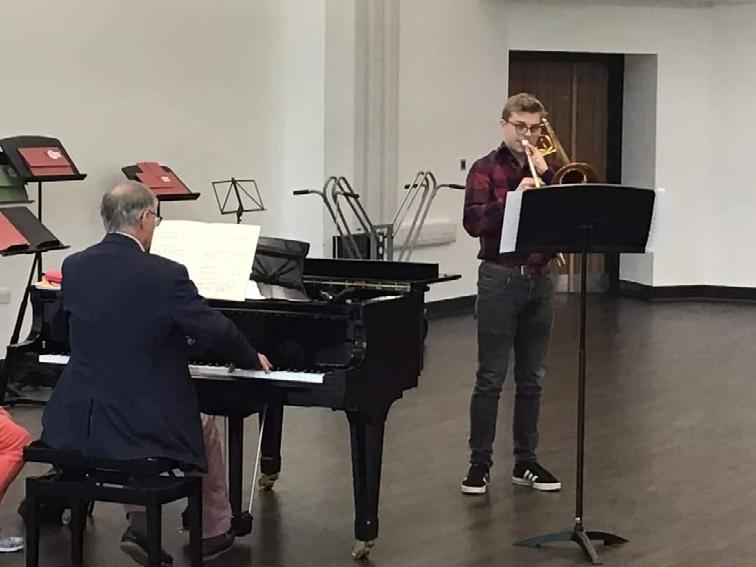
Lunn and Tim Jeffers, who put themselves forward for this session with Brett Baker. All public performances have an element of stress and although the atmosphere was obviously friendly, both players were congratulated for their playing and their readiness to perform. In fact, both players acquitted themselves very well, Andrew with the Saint-Saens Cavatine, and Tim with the slow movement from Rimsky Korsakov’s Concerto. The contrasting pieces generated several observations from Brett and audience members and as ever from a masterclass, there was a lot for everyone to learn.
Taking the master classes together the following points were made:
• Remember to sort out the basics of tuning, comfortable stance, your position and eye contact with the accompanist.
• Familiarize yourself with the piano part, but remember the soloist is the boss and the accompanist follows you on matters such as rubato and pauses.
• Concentrate on the music, not the audience.
• As soloist you can do whatever you want within the music, for example, breathing where are you feel comfortable.
• Soloist must be the best of all at everything, such as dynamics and articulation and expression, each of which should be tastefully exaggerated to strengthen the communication with the audience.
• Learn to play the piece, not to read it.
• Technical tips: for scale passages practise your
scales: for articulation passages and tricky rhythms, play it on one note to get it right, then apply it to the music.
• Move the slide quickly between positions to avoid a slurring effect.
• Use a light grip on the slide, finger and thumb only, as it allows the greatest flexibility for your arm and wrist.
• Lookout for podcasts by Ian Bousfield and Christian Lindberg who talk about their failures as much as anything, because by analysing them, and working out solutions, that is how we learn.
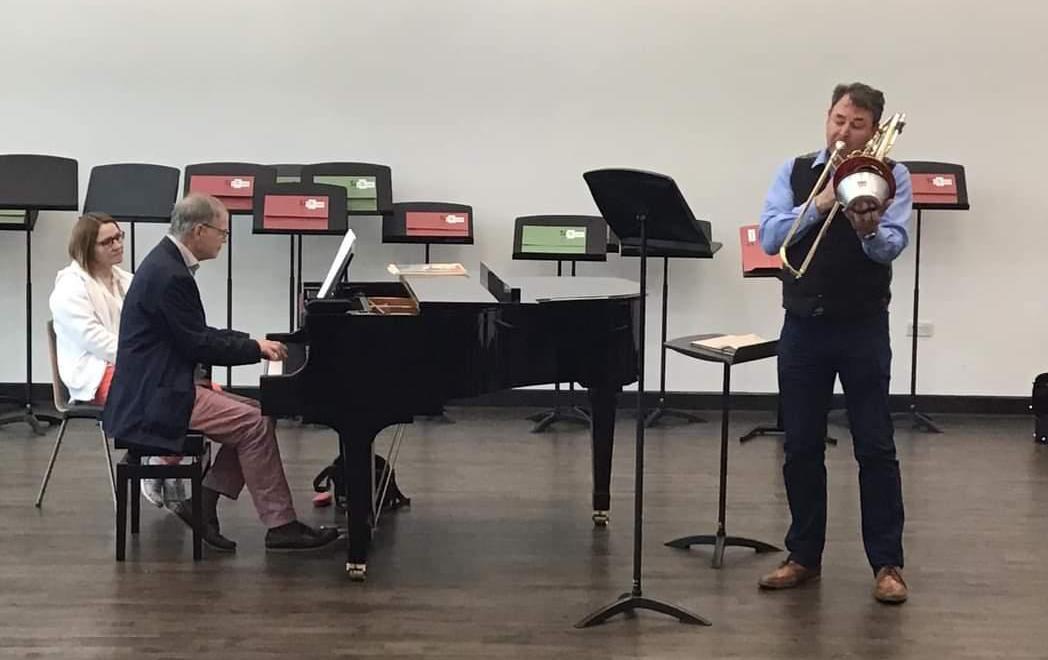
When it came to Brett’s recital, which followed, he acknowledged the influence of Christian Lindberg in his own development, alongside Don Lusher. Two pieces of music associated with Don Lusher opened the recital, DL Blues complete with wah-wah mute and leaps of several octaves, and a beautiful rendition of Autumn Leaves, arranged for Don Lusher by Bill Geldard. Lusher was known for his smooth tone in the highest of registers, something that Brett emulated effortlessly. In complete contrast, the overture to the Barber of Seville, arranged for trombone and piano, would probably have raised Rossini’s eyebrows a little, as it did the audience, but I think he would have been impressed by the brilliant articulation and sheer bravado of the playing. A contrast followed with a gentle Salvation Army melody, All that I am, which ended with the longest and quietest diminuendo of the afternoon. Robin Dewhurst’s Brasilia followed, an exciting and rhythmic display of trombone technique, accompanied by an almost equally virtuosic piano part. Brett completed his recital with an unaccompanied rendition of the Arthur Prior’s Air and Variations on Annie Laurie. A more thorough and almost unbelievable demonstration of what the trombone can do in the hands of a virtuoso player cannot be imagined and Brett’s performance confirmed not only his position of one of the leading
players of his generation, but our immense good fortune in having him come to join us in Durham.
The selection offered by Jason Holcomb and his friends in the Castillo Nuevo Trio, Alex Shepherd (piano) and David Olatanji (percussion) was music with a driving Latin pulse, such as salsa rhythms, and Cuban dance. Musical references were made to the Cuba’s Buena Vista Social Club, and the mix of infectious rhythms gave wonderful opportunities for Jason and his friends to show their improvisation skills and style of playing. Jason is adept, for example, at mixing electronics with his trombone playing and this was demonstrated to admirable effect. There was certainly swaying and foot tapping in the audience, and the infectious rhythms prompted one visitor into some mean Cuban dance moves across the floor, definitely a ‘first’ at a BTS event. Those players who wanted had a short opportunity to demonstrate their skills at improvisation, playing with Jason and the combo, which all added to the fun.
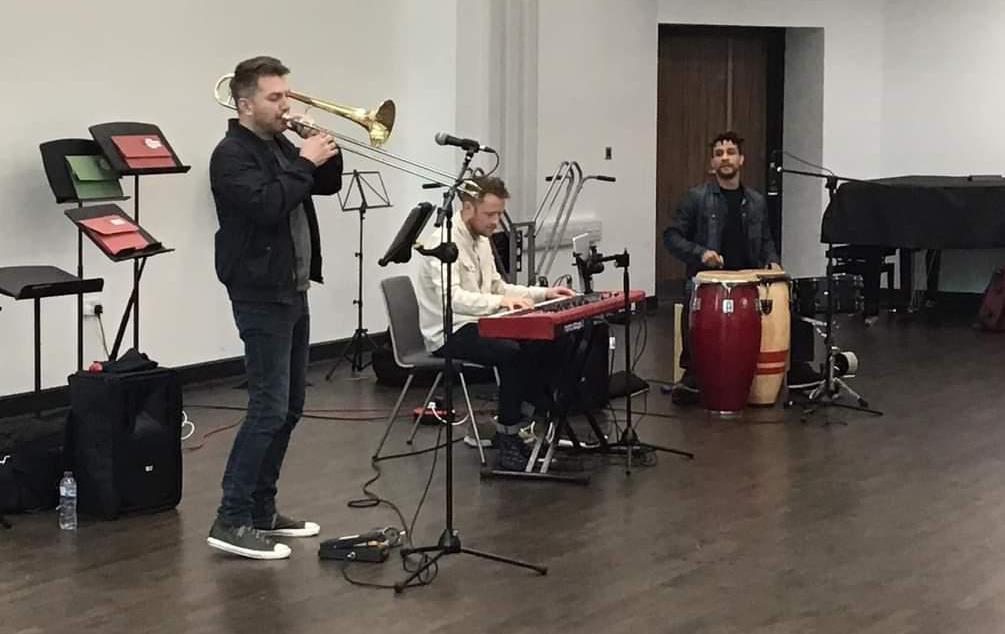
All too soon, however, we had to wrap things up, as always with a final play-through of the four massed blow pieces from the morning session. It was noted that the playing at the end was better than in the morning. Uptown Funk was certainly louder! Perhaps we had all been inspired by the afternoon’s performances, but it certainly left everybody with smiles on their faces.
As well as the dance moves mentioned earlier as a BTS ‘first’, the dancer in question was a trumpeter, from Venezuela, who had come with his friends in the trombone quartet, and he gave us another ‘first’, with a lively few bars of trumpet in the improvisation session with Jason. And finally, some of us witnessed a little four-year-old called Sullivan, play his first note on a mini pBone, a red one, his favourite colour. He was somewhat surprised at the result, and took a nervously grinning step back, but his mother is looking forward to his second what fun! ◆
BY ALAN SWAIN
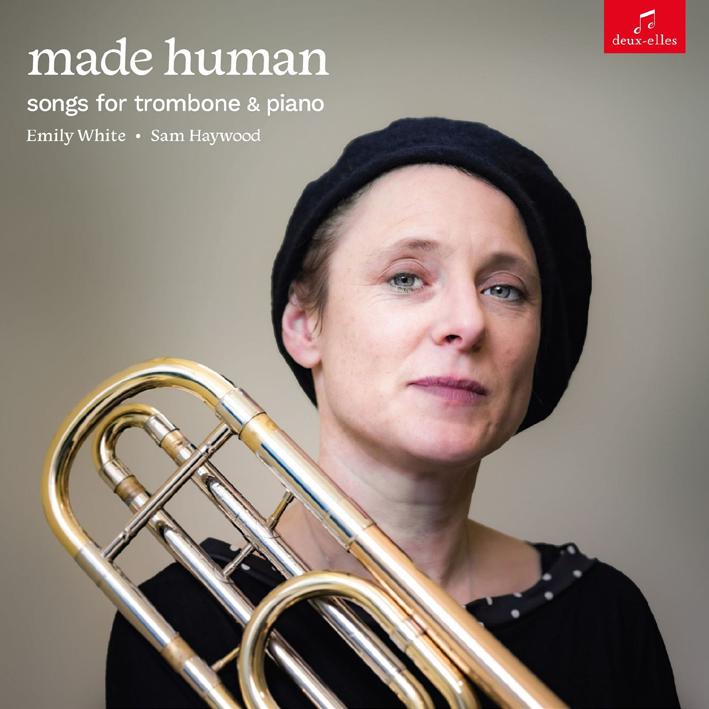
In an era where artificial intelligence continually pushes boundaries, the question of what defines our humanity becomes increasingly pertinent. As technology advances, the distinction between human creativity and machine capability blurs, prompting a deeper exploration of our unique essence.
Trombonist Emily White’s latest album, Made Human, delves into this inquiry, presenting a powerful argument for the irreplaceable depth of human expression, personal nuance, and artistry that algorithms cannot replicate.
From the opening notes of Made Human, it is evident that White’s performance transcends mere technical skill, reaching into the realm of profound emotional expression. Her trombone voice is both robust and delicate, captivating listeners with its exquisite sonority.
Approaching Made Human, I chose to listen without any preconceived notions. I avoided reading the sleeve notes or knowing the selected pieces and composers. The only knowledge I had was the album’s title, inspired by the notion that ‘God came down to Earth and was made human.’ This decision allowed me to experience the music in its purest form, and with each subsequent listen, I gained deeper insights and a greater appreciation for the artistry on display.
White’s trombone becomes an extension of her innermost self, articulating emotions that words alone cannot convey. Each track offers a distinct journey:
some pieces serve as reflective meditations with notes that seem to hover timelessly, while others present warm, intimate dialogues between the trombone and the piano, highlighting the irreplaceable value of human connection and interaction.
The album is a tour de force of expressive mastery, exploring the nature of consciousness through a tapestry of sound that is both intricate and deeply moving. Made Human unfolds like a narrative, weaving moments of tension and release, contemplation and revelation. White’s technical prowess and emotive depth converge, posing compelling questions about what it means to be human.
Throughout the album, White’s playing is a testament to the resilience and creativity of the human spirit. Her command of the trombone is a masterclass in expression, breathing life into every note.
The production, helmed by renowned producer Matthew Wadsworth, deserves special mention for capturing the warmth and richness of White’s sound while allowing the subtleties of her performance to shine through. Equally, pianist Sam Haywood accompanies Emily sensitively and intelligently, deftly mirroring the emotional expression in the solo voice.
In a time when AI challenges the value of human endeavours, Made Human stands as a powerful affirmation of our unique capabilities. It underscores that while machines may someday match or surpass human technical skills, the soul of music – the emotion, the connection, the ineffable human touch – remains beyond their reach. White’s sonorous tone and profound expressiveness remind us of the true essence of humanity.
Made Human is not just an album; it is a profound statement on the enduring power of human artistry in an increasingly automated world. Emily White’s latest work is essential listening for anyone seeking to reconnect with the essence of humanity through music.
Click here to find out more about Made Human and purchase your copy. ◆
BY TOM PILSBURY
The results of the BTS Composers’ Competition 2024 were announced on 1 August. Having received numerous entries from around the world, and after much deliberation, the judging panel of Callum Au, Alex Paxton and Dan Jenkins awarded First Place to Ian Schwalbe for Through the Concrete Jungle, repeating his success of 2023. Runners-up prizes were awarded to Shao-Tong Huang for Victory March and Sebastiano Burelli for Like a Madrigal. Through the Concrete Jungle will be performed at the British Trombone Festival 2024 and will be published by Warwick Music.
First Place – Ian Schwalbe
Ian Schwalbe is a composer and trombonist from Alpharetta, Georgia, USA. He has just graduated from the University of South Carolina with a BM degree in Composition, having studied composition with John Fitz Rogers and Fang Man, and trombone with Michael Wilkinson. He will continue his composition studies at Florida State University next year, working towards a master’s degree.
Whilst at USC he was a member of the USC Wind Ensemble and Symphony Orchestra and also a member of the Carolina Crown Drum and Bugle Corps. He has performed at the Brass Institutes of America festival in Wichita, Kansas, and with the South Carolina Brass Band.
As a contemporary composer, Ian enjoys writing works for a variety of chamber ensembles and brass ensembles. He has had chamber works performed at the Atlantic Music Festival in Waterville, Maine, and his compositions are frequently performed by the USC Trombone Choir.

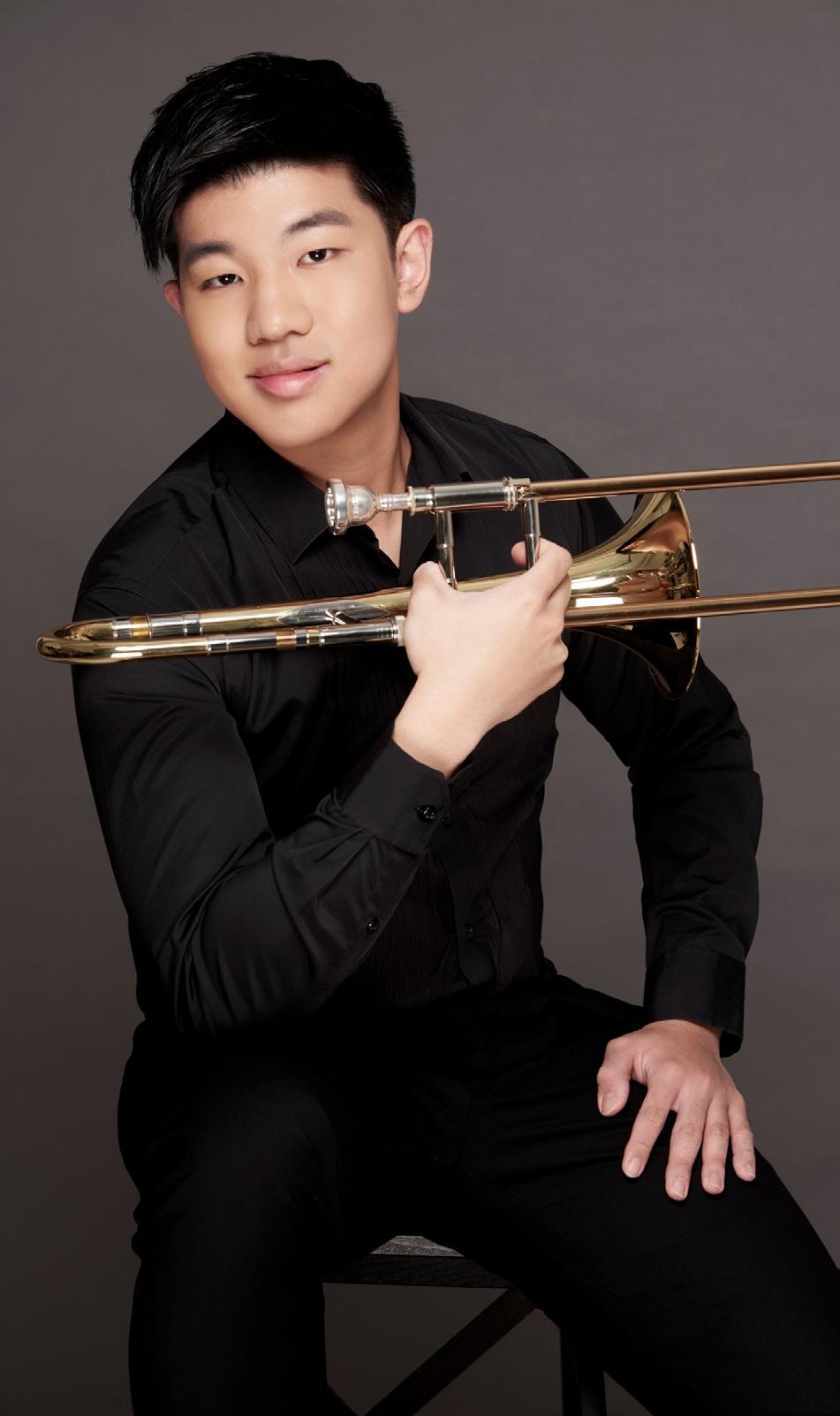
Runner-up – Shao-Tong Huang
Taiwanese trombonist Shao-Tong Huang will begin undergraduate studies at the Conservatorium van Amsterdam this Autumn, having recently graduated from the Music Department of the National Taiwan Normal University Affiliated Senior High School. He has held principal positions in the Taipei Philharmonic Youth Orchestra, Golden Hymn Youth Brass Band and NTNU Affiliated Senior High School Orchestra, and in 2023 he was awarded a full scholarship to the National Taiwan Youth Orchestra and received their outstanding performance award.
Having achieved first prizes in Taipei City and national trombone competitions, in 2023 he received an Honourable Mention from the International Trombone Association Gilberto Gagliardi Tenor Trombone Competition. He has received tuition from many world-renowned trombonists, including Joseph Alessi, Zachary Bond, George Curran, Scott Hartman, Dietmar Küblböck, Matthew Knight, Allen Lee, Peter Moore, Bradley Palmer, Jörgen van Rijen, Peter Steiner, Stefan Schulz, and Ko-ichiro Yamamoto.

Runner-up – Sebastiano Burelli
After studying trombone with Andrea Piergentili at the Music High School of Udine, Italy, Sebastiano Burelli attended the composition course at the “B. Marcello” Conservatory of Music, Venice, in the classes of Corrado Pasquotti and Renato Miani, graduating with honours. He is currently studying choral conducting and choral composition at the same institute.
He has participated in various composition competitions in Italy, obtaining numerous awards and honourable mentions. He has attended courses and masterclasses with renowned composers, such as Emanuela Ballio, George Friederich Haas, Stefano Gervasoni and Ondrej Adàmek. He was a member of the II and III editions of the ‘Jury of Conservatory Students’ at the Venice Biennale Musica, in 2022 and 2023 respectively.
His compositions and elaborations have been performed in Italy and abroad. He has collaborated with several important instrumentalists, such as Alex Sebastianutto and Athos Castellan, and with various instrumental and vocal groups, including the Filarmonici Friulani, Intende Voci Ensemble and the MAC Saxophone Quartet. ◆
BY NATHANIEL DYE
I can’t remember why, at the age of eight, I wanted to learn the trombone. Apparently, I just … did … and it was that or nothing. Whatever the fickle childish reasoning, I was incredibly fortunate to have found my musical spirit animal so early on. You could say we’ve never looked back, and this is the story of me and a lifelong companion that has stuck with me right through the best and the very worst of times
Childhood memories are hazy but not that first Boosey and Hawkes beginner model which arrived on loan from Redbridge Music School about a week before my first lesson. It came in what seemed the most enormous chest of a case and gave off that distinctive aroma of recently applied slide cream. I set about buzzing on the mouthpiece and in my youthful enthusiasm, put the thing together…the wrong way round, naturally – the last thing anyone would have called me was a ‘natural’.
Born three months premature and spending my single figure years doing my best to catch up physically, academically and socially, it’s fair to say that in music, as in life, I was a late developer. But determination at least partly made up for a lack of discernible talent and I painstakingly progressed from primary to secondary school from 15 to 30-minute lessons and with a trombone, rather than trumpet teacher. Needless to say, this all helped. And so did the school and local music school system I grew up with. My little two-form state primary school had a flourishing orchestra and after a couple of years getting used to assembling the instrument properly and making an almost reliable sound (though not quite able to reach 7th position) I was invited to the music school brass club. They probably just had a warm body policy but no matter – I was delighted to be there.
In my teenage years, I progressed through the ensemble ranks in a way that few modern day music hubs would be able to facilitate now: from junior to intermediate wind band, then staying on for Intermediate Orchestra. A promotion to the Senior Wind Band and Symphony Orchestra aged around

14 didn’t do much for the emerging social life with rehearsals on a Friday night but I really didn’t mind. Neither did the young musicians I hung out with at the time. I suppose music geeks will always stick together –not just staying in touch decades later, but still playing.
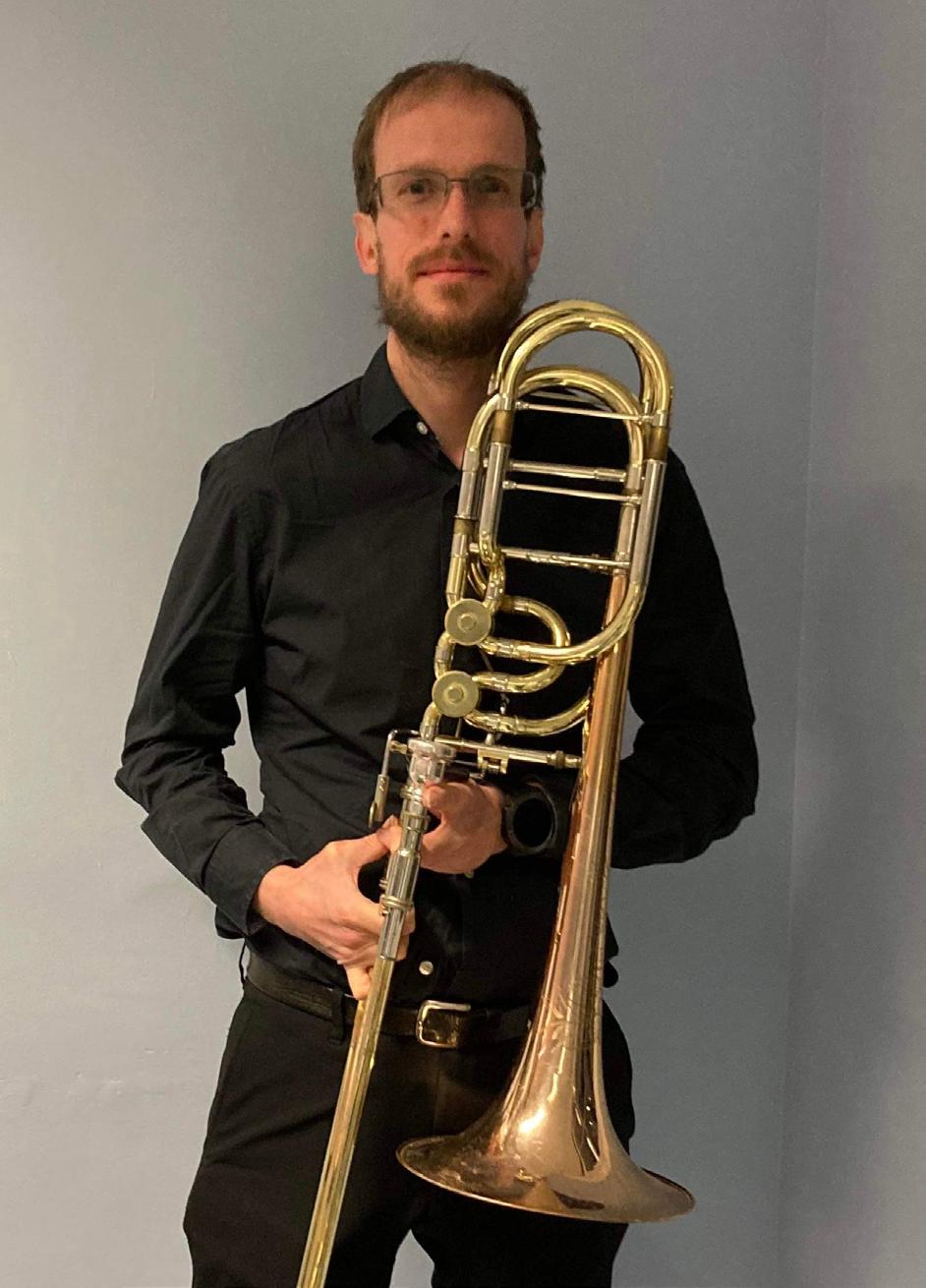
Dental work and braces made me a good candidate to switch to bass trombone somewhere around this time. I was incredibly fortunate to have a supportive family who (somehow!) bought me a brand-new Shires. Forget that ill-fitting school uniform – this instrument was something to grow in to! So quite early on, I developed a reputation for making a big sound and being told off by conductors for overpowering the rest of the orchestra. Imagine my delight when being introduced
to big bands and this being a virtue. My first solo came courtesy of a NYJO workshop, where I proceeded to make up for a complete lack of improvisational ability by squeezing as many notes as possible into twelve or so bars. Thankfully, this inauspicious introduction to the organisation and to soloing didn’t stop me turning up on Saturday mornings to play with the second band and, very occasionally, the main one when they were short.
Not quite good enough to do the rounds of music college auditions, I settled for the next best thing with lessons from Alwyn Green (with a cameo from Sue Addison) at university in Birmingham. The tendency to spend all my time in rehearsals and take every gig going continued but it was clear quite early on that I wouldn’t be making a living from playing. This was evidenced at the St Endellion Festival, where it was a kind of pros’ busman’s holiday and I couldn’t keep up – not so much with the playing, but the drinking and that brass section drank a LOT. But I did emerge with one compliment
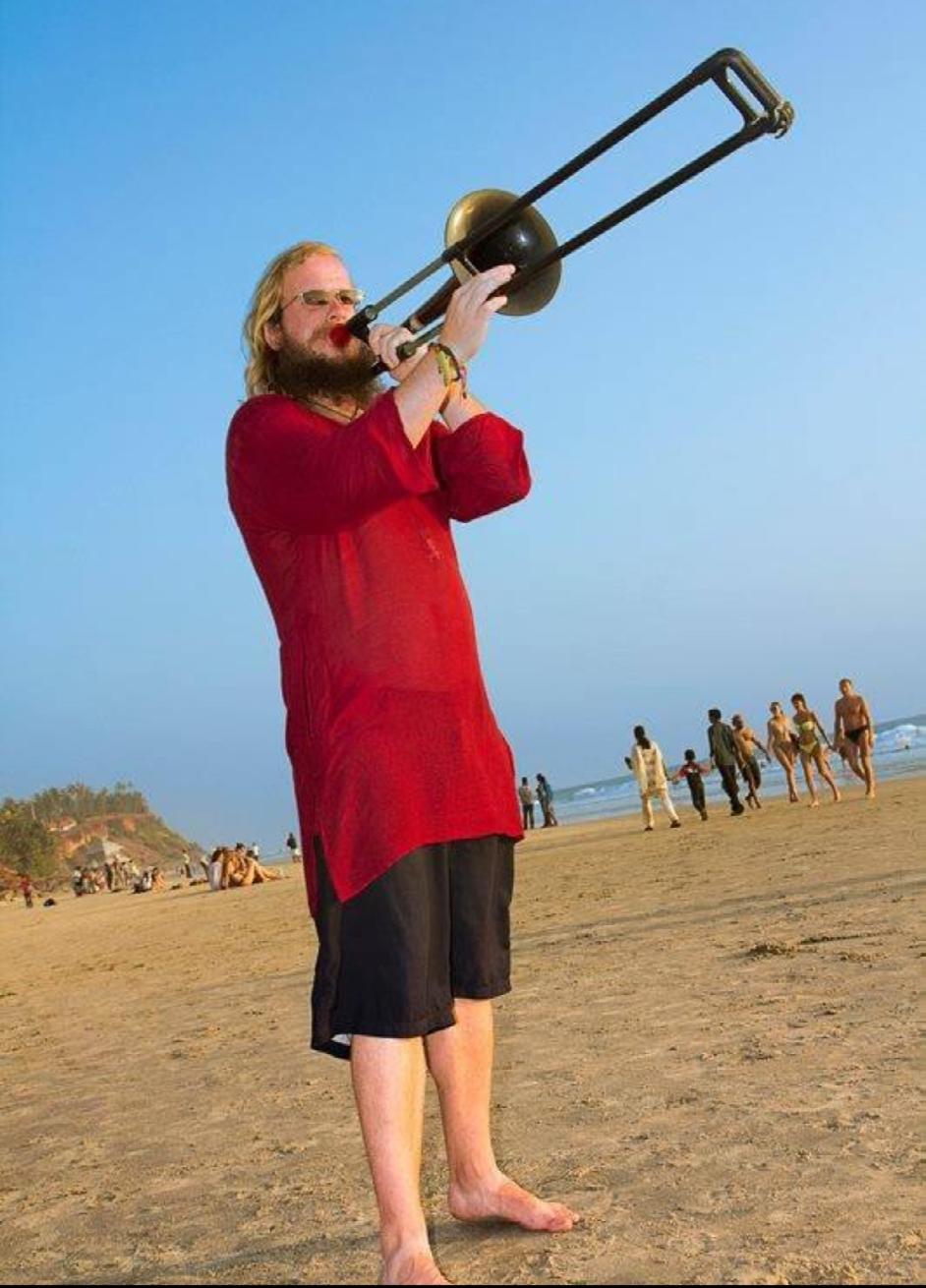
from Richard Hickox, who said my Beethoven 9 solo was the best he’d ever heard because it was subtle enough to support the ‘cellos. Needless to say, I didn’t live this down and was reminded of my ‘subtlety’ for days. So much for the big sound – that’s what a vicious hangover does to you!
So, like many an orchestral musician faced with the harsh economic realities of graduation, I went into teaching and, well, really struggled. I was told to play
to my strengths and bring my trombone to lessons, something that has stuck with me to this day as it really did help. It’s like having a trombone to hand puts me on firm ground even when I’m not at a gig.
It amazes me how possible it is to play your main instrument, even in the midst of lip quivering emotion. Regular performance anxiety aside, my first experience of this was at the funeral of my fiancé Holly, who died when we were both 25 years old. We’d played together in Fairlop Brass Band, who provided the hymns. It was probably for the best – I couldn’t have just sat and listened. Perhaps understandably, I needed a break from real life, so in the autumn of 2012, I got a backpack and went travelling around the world. This may sound like a standard, if early midlife crisis decision, but I didn’t meet anyone else with a pBone and busking amp weighing them down. With the St George’s Cross painted on the bell, I was ready to support at a few England cricket matches and even met Billy the Trumpet in New Zealand. I found myself in beach bars and restaurants playing lounge jazz as well as pavements all over the place. I was only rarely asked to move on, most memorably by a Colombian official with a big gun at his hip – it turned out I was serenading the Mayor of Cali’s mansion!
In India, I teamed up with French guitarist Mikey to form the crazy family travelling band. We spent months bringing our strange mix of hippie traveller music to all parts and the novelty got us on TV and in local papers.
After two years of this itinerant lifestyle, the responsibilities of adulthood had to return eventually, and I worked my way back into teaching and more formalised ensemble playing. I started conducting a local East London wind band, which led to Pavilion Brass, who still let me wave my arms around in front of them now. But with a full time primary school teaching job, there was only time for occasional trombone depping, and so it continued for years. Oh, and I got into running
It was about 20 years too late, but I started to feel the conflict between music and sport that teachers so often have manage with their students. For a while, running occupied many of my weekends when there could have been gigs and I filled my time by running to rehearsals. This newfound hobby took me from round the block to marathons to ultramarathons of over 100 miles. As I approached my mid-thirties, life was getting busy! Teaching expanded to Saturday mornings with a local music service jazz band, and at one point I led ten regularly rehearsing ensembles.
This all came crashing to a halt – not only with Covid lockdowns, but with the death of my mother, Jill, from bowel cancer. Buying me that beautiful bass trombone was just one expression of her love, so it seemed fitting that, once again with quivering lips, I played at her
funeral. Of course, this wasn’t the most technically proficient rendition of the Sarabande from Bach’s Fifth Cello Suite but in such circumstances, that’s a long way from the point.
I suppose the pandemic years of 2020–21 were tough, as for everyone, but it was in the autumn of 2022 when my world really fell apart. I’d struggled with some nagging medical issues for a while. Well – it turned out I had stage 4 incurable bowel cancer and a bleak prognosis. What happens when you receive the worst possible news? In my case, it was the pursuit of normality in the form of playing and teaching. That included the usual relentless December full of concerts before chemo kicked off a week before Christmas.
Off sick after emergency abdominal surgery in the New Year, it didn’t take long for me to seek out playing opportunities and I was straight back into big bands and such. And with a newfound brazenness to just ask for what I want, ended up with far more playing than before as I slowly recovered. I ended up playing a summer of festivals with New Orleans style Babel Brass and a ska punk band called Filthy Militia
But as I began to find my feet – moving fairly quickly again – I began to daydream about an idea I’d had in my head for a while. The London Marathon is unique amongst the World Majors in being a race where people run with all sorts of encumbrances like rhino outfits and diving suits, whilst raising money for charity. With cancer in three places and a colostomy bag, l didn’t fancy the rhino costume, but what about something a little more familiar? How about running whilst playing the trombone? After all, I enjoy doing both separately!
It wasn’t hard finding a charity partner – Macmillan Cancer Support had already been fantastic to me, for example with free counselling – it’s not easy to come to terms with the fact you’re dying. I received my first donation from Warwick Music in the form of a green pBone that so exactly matched the Macmillan colours that people thought I’d had it commissioned. Clearly this partnership was meant to be.
Back at work in Autumn 2023 and revelling in winning a national Music and Drama Education Award, the trombone marathon was on the back burner, but I felt fit enough, all things considered, having made a glorious 100 mile running comeback. Surely this wouldn’t be too bad in comparison? We’ll … not for the first time, cancer had other ideas and by January 2024, my tumours had grown to the point that I needed to go in for more chemo.
This made things a little difficult. Managing the side effects was a full-time job and on the days I made it off the sofa, I barely had the energy to pick up the trombone, let alone run with it. But I did my best with the time I had and set about learning the diverse list of tunes people had sponsored me to play including, you
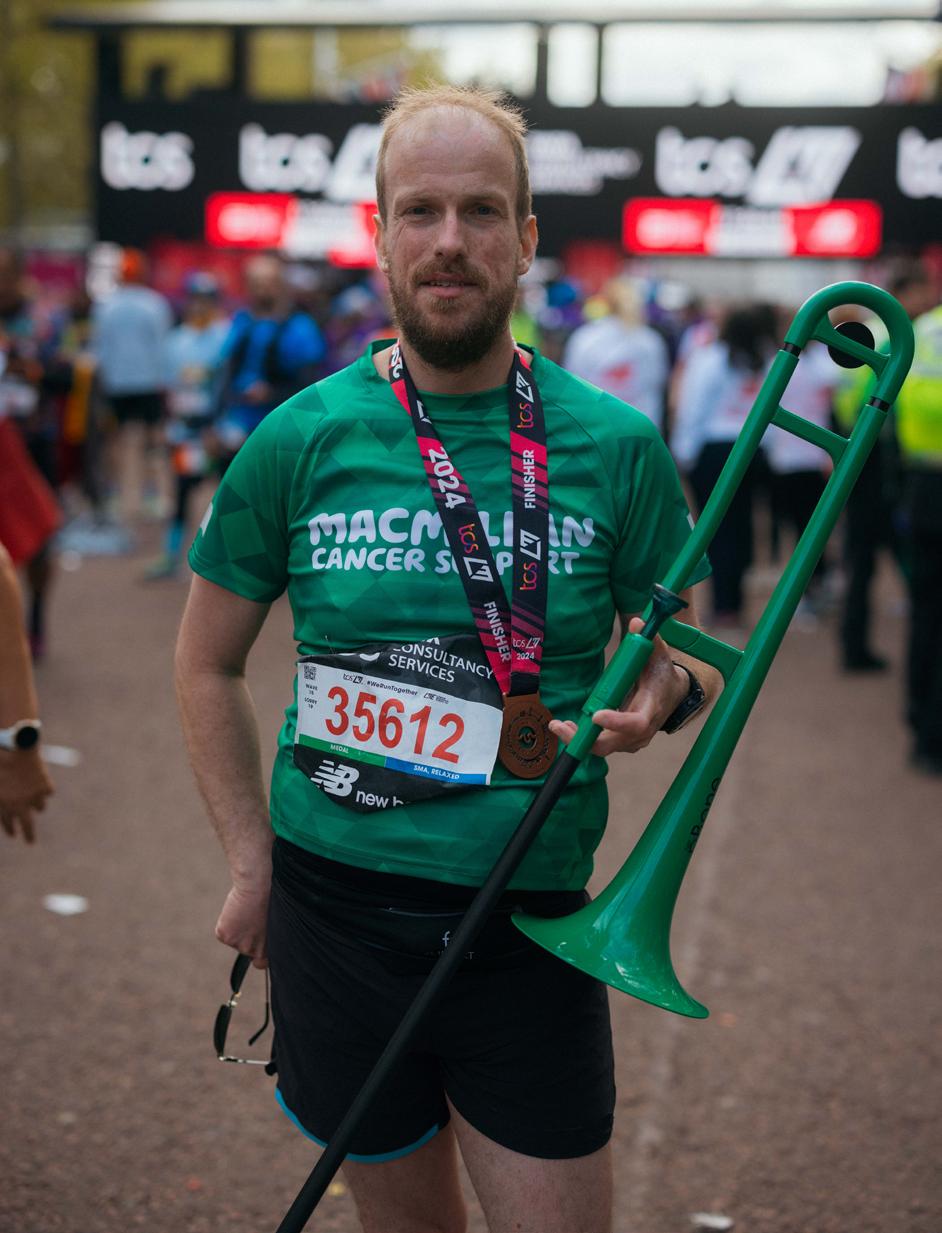
guessed it, The Acrobat, Sweet Caroline and Flight of the Bumblebee. Thankfully, it didn’t take long for me to pick up the new melodies. I guess all that time spent busking came good eventually. There was also a charity concert, put on by Pavilion Brass, where I took a break from conducting to solo on Georgia on my Mind. I wasn’t feeling great, but right there is proof that the show must go on – and it did. More importantly, we raised over £2,000 that day.
As the marathon month of April arrived and the effects of my three-month chemo block started to subside, finishing the race was starting to feel like a realistic prospect. I even managed a 5k park run and a few laps of my local lake with the trombone – breath control was hard, but not impossible. Plus, I’d gotten myself onto the cover of Runner’s World Magazine and had a full on week of media interviews lined up. What’s more, I wasn’t going give up the chance of performing in front of a crowd of 750,000 spectators easily – this was set to be the biggest gig of my life!
The media stuff was definitely getting me, and the charity efforts, noticed and I appeared all over TV, radio, newspapers and podcasts. But the most special of these was without doubt filming with star trombonist Carol Jarvis at the Cutty Sark to duet the Sailor’s Hornpipe, goading each other to play it increasingly faster. No prizes for guessing who won but I put up a valiant effort.
Speaking of effort, 21 April was race day and rather than being nervous, I was a bit relieved that it had finally arrived. Starting at the back beside a bloke doing
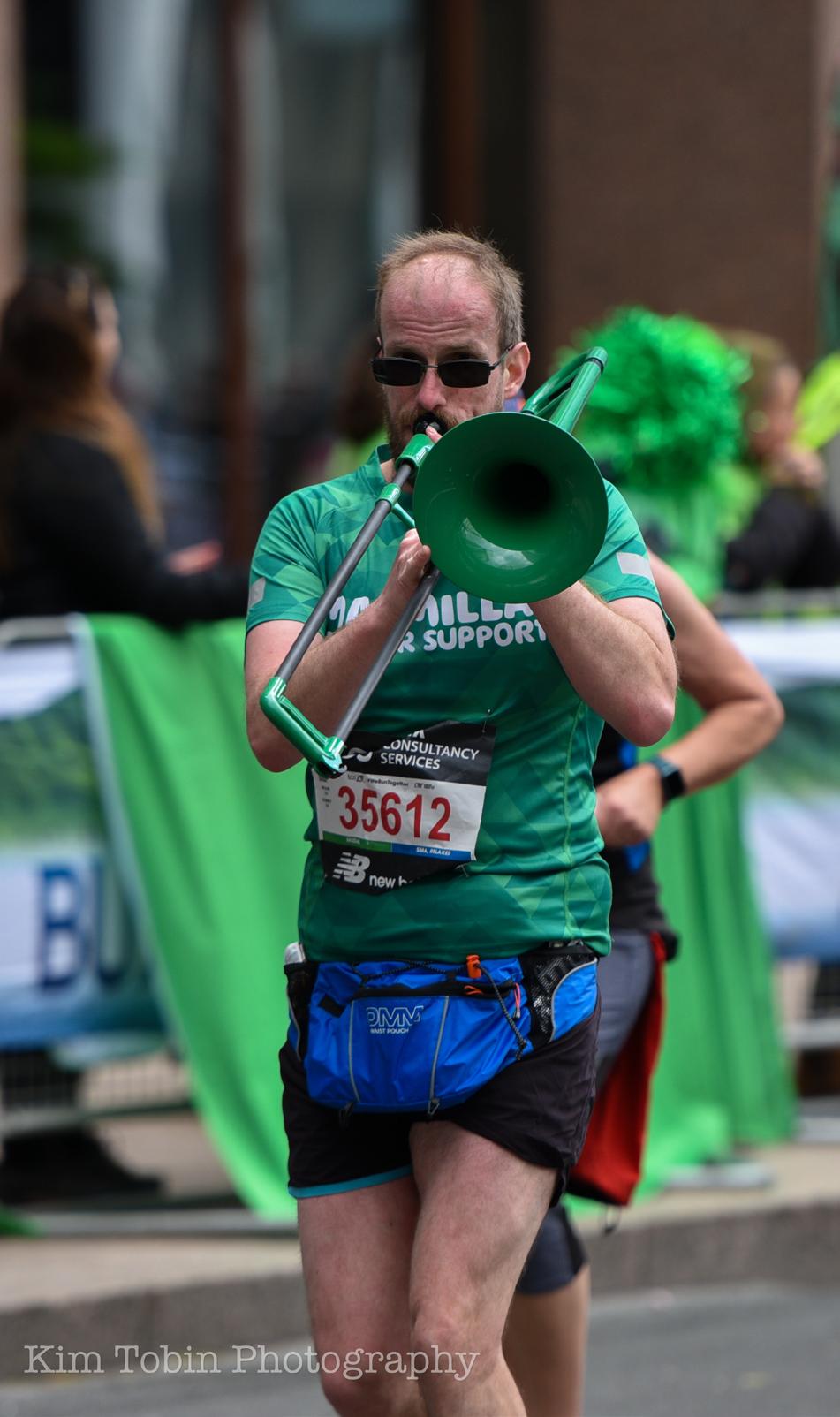
keepy-uppies all the way, it all felt a bit surreal. And my speaker for backing tracks wouldn’t work. I ditched it at the start and this proved to be a brilliant decision – not just for being lighter but because I could react to my surroundings – like playing a national anthem if I recognised a flag or Jurassic Park if I saw a dinosaur costume. An overwhelming number of people told me afterwards how much they’d enjoyed these moments. The atmosphere was phenomenal and all it took was a couple of honks to provoke a huge cheer. I took every opportunity to stop and jam with the bands playing along the route – this was just one long carnival procession! As the miles ticked by, I worked my way through the repertoire and was particularly satisfied to have timed the chorus of Livin’ on a Prayer to start as I crossed the halfway line.
I certainly can’t claim to have buzzed my lips for every single second but I really did run the London Marathon whilst playing the trombone. As the finish line approached, most people were just gritting their teeth and getting on with it, but I had all sorts of mixed emotions. I slowed to a walk so I could play more continuously and revel in the triumphant atmosphere on
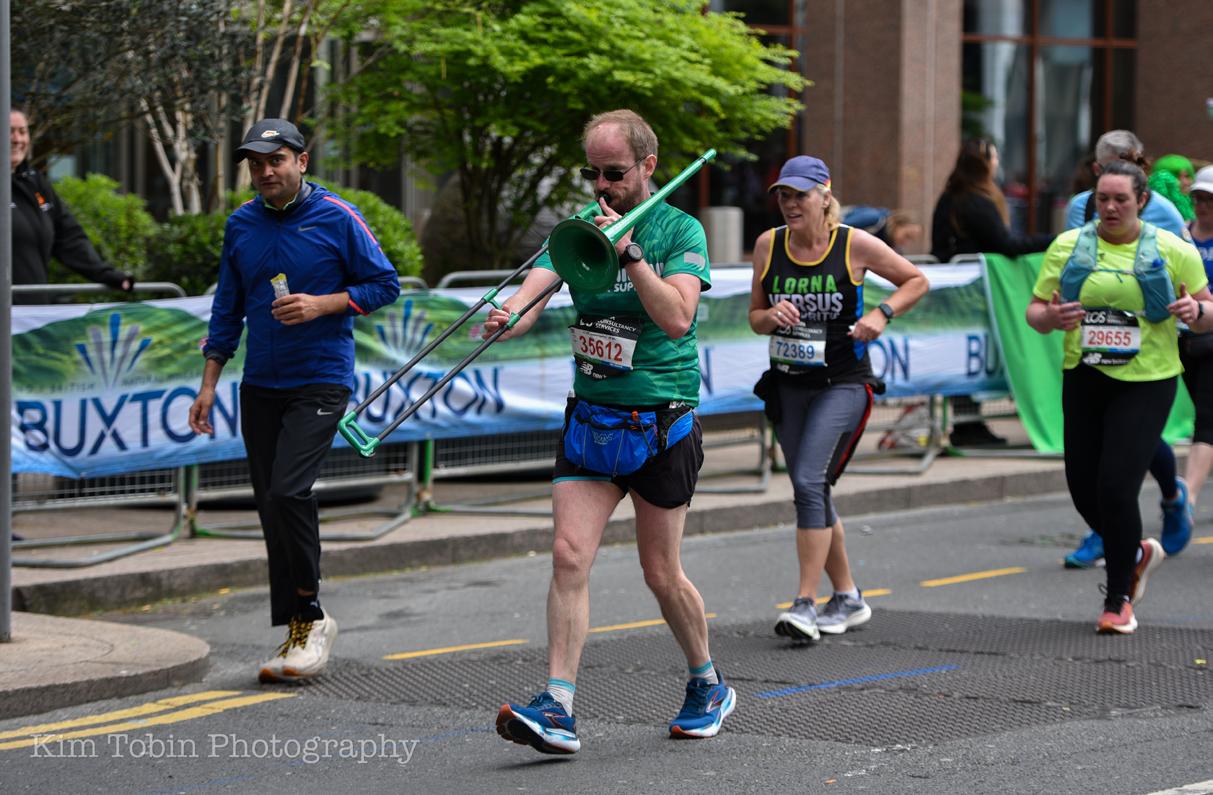
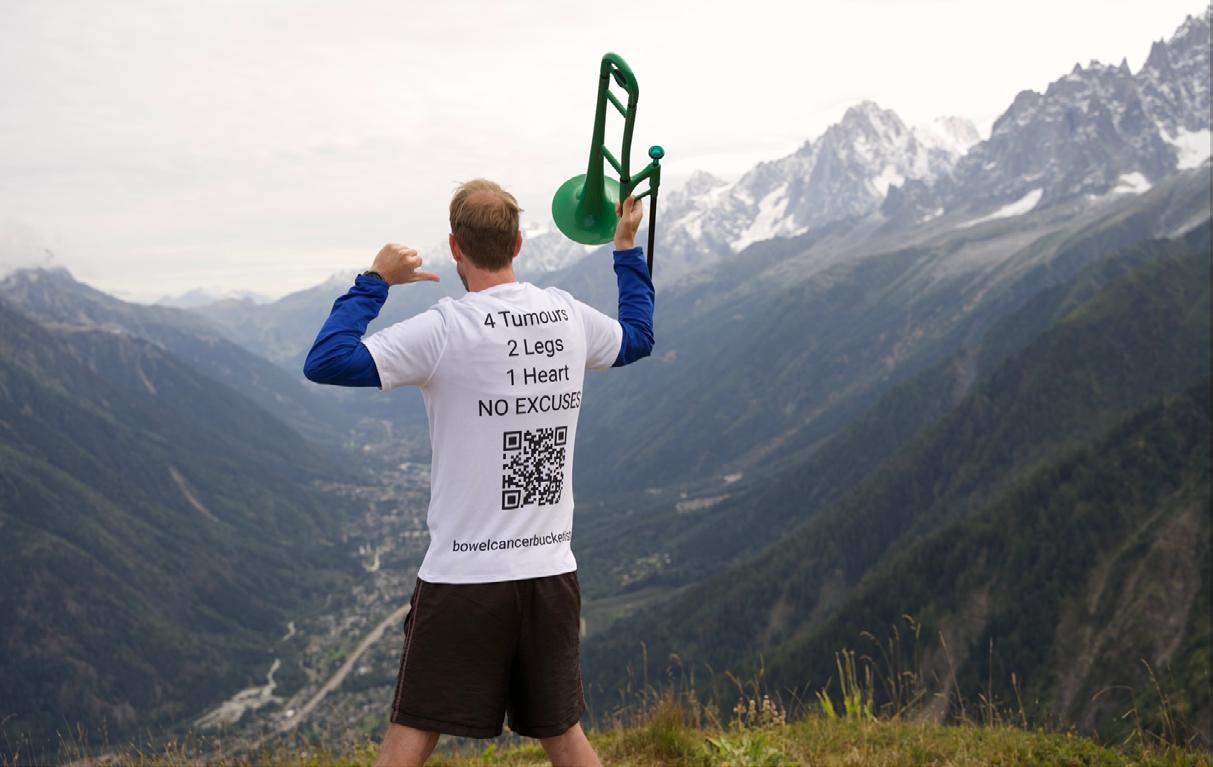
the Mall. And right there a thought struck me – what on earth was I going to play as I crossed the line? What was significant enough that it could crown this moment? I thought about it and, deciding that there the answer was nothing, improvised a bit of a first position fanfare as my watch showed I’d finished inside six hours.
The interview with the official Marathon filmmakers was pretty emotional – I was in disbelief. In running as in music, you earn the right to enjoy euphoric moments like this in the practise room and pounding the pavements. But I’d barely run a step all year – I had no right to pull off that kind of achievement. But somehow, I did. And nothing, not even cancer, can take that away from me.
Nathaniel is currently run/hiking from John O’Groats to Land’s End and welcomes playing opportunities and/ or offers of accommodation along the way. To find out more about his story, track his progress or to donate, visit bowelcancerbucketlist.com ◆
BY ALASTAIR WARREN
The Sinfonia of London’s recently released second volume of orchestral works by Kenneth Fuchs features the world première recording of his Bass Trombone Concerto in its orchestral form, performed by James Buckle. In addition to being a member of conductor John Wilson’s handpicked band, James is Principal Bass Trombone of the Philharmonia Orchestra and a Professor at the Royal College of Music.
James tells us about his experience preparing and recording this fantastic new work.
‘Around April, John Wilson sent me a message asking if I would like to record a concerto in late November or early December during a patch of work booked with the Sinfonia of London. Initially, I had mixed feelings. I had not recorded as a soloist before and already had a very busy schedule in the Autumn, but we had recorded some of Kenneth’s music before and enjoyed it, so I asked to see the part and playing through thought, ‘Yes, I can do this’ … and then put it aside for several months.
Returning to the piece in July, I realised that although being very playable, without too many fast technical passages, it was tiring building up and sustaining the emotion and tension I was aiming for across very long phrases. The piece sits relatively high for bass trombone; one passage doesn’t drop below a middle C for about three minutes, and sustaining tone and intensity over that span requires a different type of stamina compared to orchestral playing. There are many cadenza-like passages – one from pedal E to high B, sempre mp –which I found needed playing every day; in the end I memorised them.
Leading up to the recording sessions, having a very heavy schedule with lots of big orchestral concerts, including the night before the first recording session, I felt I was hitting a bit of a wall. In the end I took a day off about a week before the recording and it was one
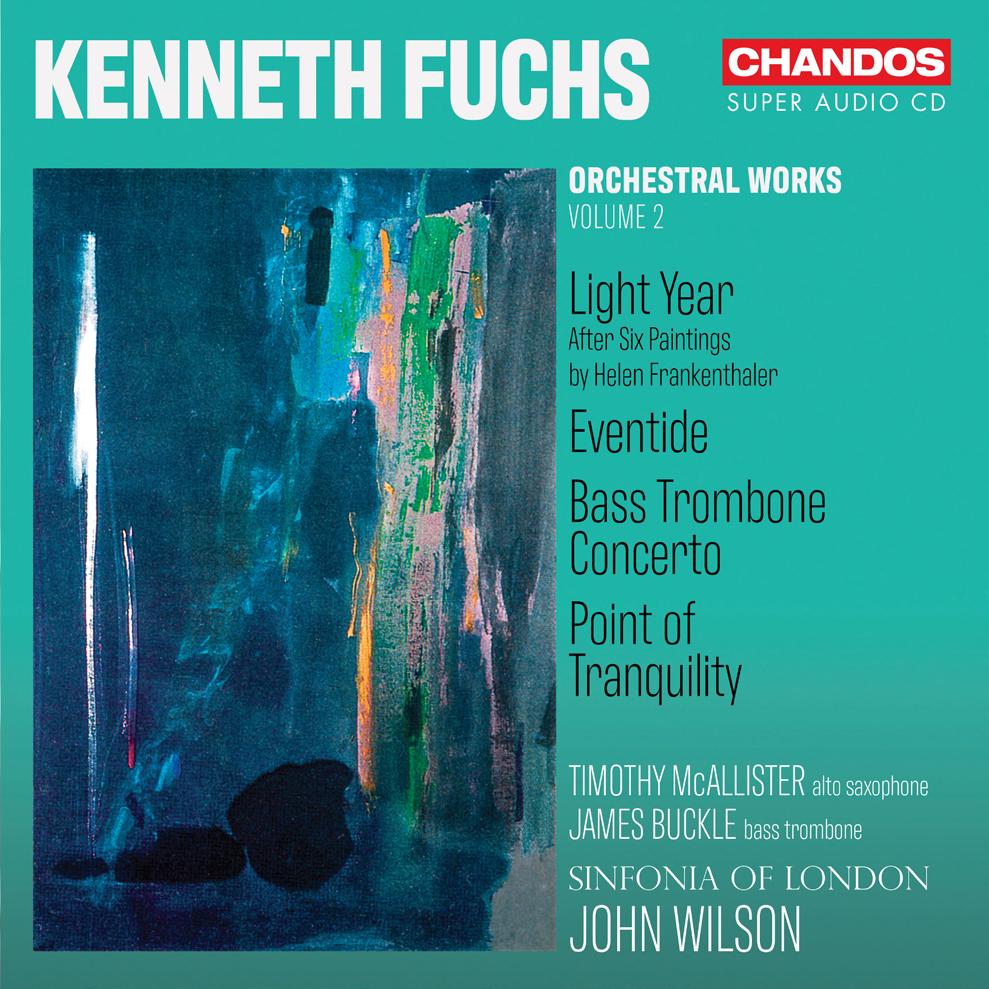
of the best decisions I’ve ever made, and an important lesson learnt – pushing on through, as we often tell ourselves to, is not always the best option.
During the recording sessions Kenneth was incredibly open and supportive. We had met up online some time earlier for a play through; a little nerve wracking as the first thing he said was ‘I’ve heard great things about you’, so no pressure at all. We ended up talking for about two and half hours, discussing my concept of the piece, and nuances of dynamics and articulation which were in Kenneth’s mind, but which had not fully found their way into the notation. During the recording itself it was great to have him on hand to understand exactly what he intended if something wasn’t quite making sense, especially when playing with the orchestra for the first time.
In the end all the practice and preparation paid off, we finished recording with half a session to spare!’
Fuchs is celebrated for his lyrical melodic writing and masterful orchestral writing. By turns the concerto is lightly jazzy, to my ears reminiscent of a cool jazz inspired post-war American film soundtrack, or darker and more serious, more contemporary, with many complex layers. The orchestration is luminous, Holstlike at times, perfectly judged to support and highlight the soloist without being overpowering.
James is superb throughout. On first listening I was struck by his effortless connection between the registers, with a truly singing legato, and his ability to sustain musical direction across the entire 22-minute span of the work is masterful. I know both were priorities in his preparation and the result is magnificent.
Click here to purchase a copy of the CD or listen via your favourite streaming service. Sheet music is available from the publisher. ◆
BY ALASTAIR WARREN
Bones Apart, the trailblazing trombone quartet, celebrate its 25th anniversary in 2024. During that time, the quartet has performed at the Edinburgh International Festival, Wigmore Hall, St Martin-inthe-Fields, Queen Elizabeth Hall, Symphony Hall Birmingham and Fairfield Halls, in addition to multiple broadcasts on BBC television, BBC Radio 3 and Classic FM. Recitals, masterclasses and workshops have been undertaken worldwide, with appearances at the Juilliard School of Music, Chicago College of Performing Arts, Royal Birmingham Conservatoire, Royal Conservatoire of Scotland, Royal Welsh College of Music and Drama, Wells Cathedral School and the Guildhall School of Music and Drama. The quartet has toured throughout Europe, the USA, Cayman Islands and Japan.
Founding member, Becky Smith, looks back on their story so far …
ALASTAIR WARREN: Take us back to the beginning, what was the genesis of Bones Apart?
BECKY SMITH: As students at the Royal Northern College of Music, the four founding members, Carol Jarvis, Becca Pope, Camilla Tveit and I, were put into a quartet together to work upon, and hopefully improve, our ensemble playing. I think the main reason we stuck at it in the early years was because we bonded as a group, becoming first and foremost good friends; we enjoyed rehearsing together, playing was fun. We collected some suitable repertoire and started to do our own arrangements. We entered competitions for something to work towards and eventually got our Professional Performance Certificate from the RNCM in 2002, all the while being the best of friends.
AW: Just two years after forming, Bones Apart won the Royal Over Seas League Ensemble prize and the Philip Jones Award. What opportunities did that bring the ensemble?
BS: Winning the ROSL ensemble competition was a real springboard for the group, leading to performances at established music venues and festivals. It was at that time we realised we had something unique to offer audiences. The ROSL organised recitals around the UK for us and it cemented our passion for the group, gave us valuable experience in communicating with promoters and audiences, self-promotion and publicity, as well as programme planning and research. We performed at the 2002 ITF in Texas and were gobsmacked by the reaction to our recital. We were treated like celebrities, it was surreal! This led to a lot more work in the USA over the following decade.
AW: What do you think has led to Bones Apart’s longevity?
BS: It’s frightening to think we are in our 25th year; time really does fly! We all know the trombone is a hugely versatile instrument covering a wide range of styles and genres, but still the chamber ensemble opportunities are limited, compared to string or woodwind players. So, I think the longevity is not only down to a passion for our instrument and a love for music, but also the drive to create new repertoire and programmes for trombone quartet. It is also lots of fun to get together socially as well as musically, as we are great friends. We still get excited to play certain pieces, enjoy trying out new repertoire and formulating new programme ideas. We love the challenge of trying to vary our sound and to inject more character
into our playing. As much as we all love and admire that typical orchestral trombone section sound, a whole recital of it can be tedious for all concerned!
Chamber music of any kind is a labour of love; we are certainly not doing it for the pay cheques! This is another reason why we strive to fit the quartet around our other work. It really is a passion for us, and we don’t expect anything in return; we enjoy it and still have lots of fun.
As an ensemble we have seen several personnel changes over the years; former members Camilla Tveit, Becca Pope, Carol Jarvis, Arlene MacFarlane and Lorna McDonald, are all still blazing a trail in the music profession. I think the driving force of Bones Apart’s ethos has stood us all in good stead for navigating our individual careers and seeing where that takes us.
AW: Looking back how do you think the music scene has changed for female trombonists since Bones Apart was formed? What part has Bones Apart played in that change?
BS: Professionally there were not as many female trombonists out there when I was studying but that has really improved, with several orchestral posts held by women, plus many excellent female freelancers. There is wide recognition that in some parts of the world female brass players are not well-represented and things are in motion to rectify this, spearheaded by the indefatigable Abbie Conant. What has changed is for the better, but personally speaking as a British trombone player, I don’t feel there has been a huge shift for female players. I think a comment from American trombonist Hillary Simms sums things up well, ‘…and yes, I am a woman, and unfortunately, we live in a society where I’m a female trombonist, whereas my colleagues are not male trombonists.’
To continue from an earlier point, there is thankfully a much greater range of chamber ensembles around now. When we were at college it was pretty much only brass quintets or dectets, but people have become inventive with new types of smaller groups, which is great to see. For example, Septura, Old Dirty Brasstards, Bella Tromba, and Oompah Brass. They have all been crucial in creating work and new repertoire for future generations of brass players and we really owe these innovators our gratitude. Long may this creativity continue.
Technology is probably the biggest change we have seen. When I was in my first year at the RNCM people were only just getting mobile phones. Now, we rely on them constantly, using them for everything from a metronome and tuner, to blasting social media with shameless self-publicity – a necessary evil nowadays.
I’d like to think that over the years Bones Apart has inspired lots of young people to either begin learning the trombone, or to continue learning it with real commitment and enthusiasm. When undertaking our first education projects with the quartet I remember how
many of those school children didn’t even know what a trombone was. For them to hear and see a quartet of trombones played by females was, and still is, a great introduction to the instrument. To go from having no preconceived ideas of the trombone and the gender of people who play this comedic-heroic instrument, to some of the kids thinking that ONLY females play the trombone is wonderful!
I think the UK leads the way with regards to male to female ratios in trombone players, arguably better than trumpets, and definitely tubas, but we can always do with a better representation of the UK demographic. However, we need more trombonists in general! The lack of children taking up the trombone is deeply concerning, and one tell-tale sign is the ever-decreasing number of applicants for music colleges. We need to go back to early school years to show young children one of the greatest human achievements: Music! They can learn the skill and enjoyment of playing a musical instrument, which is widely known and scientifically proven to enable and unlock all sorts of other essential learning skills along the way. Show them what they can achieve, enjoy with friends and even make a career of, but only as long as they are given this crucial opportunity at that early age. There is so much work to do to get us to this stage and we all need to work together to rebuild the fragile musical landscape, before these essential life skills are lost forever.
AW: What does the future hold for Bones Apart?
BS: In the long term I’d be happy to see the quartet continuing as we are now. We do three or four patches of work a year, which seems to work well for all of us. It’s a reasonable commitment to make, not forgetting that quartet playing and the stamina it requires is really very different to our normal playing environments. When we are not performing with Bones Apart we are all working elsewhere in the music business: Helen is Principal Trombone of the BBC Symphony Orchestra and a member of the Chamber Orchestra of Europe, Jayne is freelancing and conducting a number of ensembles, Sarah is doing a run of Hello Dolly in the West End and I’m Principal Trombone in the orchestra at ENO. In addition we all freelance with many of the UK orchestras and dep in West End shows, amongst other things, so it’s a welcome change for us all when we do get together.
In the immediate future we have various dates in the diary, including being a part of the British Trombone Festival in Birmingham, which we are really looking forward to. We hope to see and meet lots of BTS members there, so do come and say hello! We have some concerts and workshops coming up in Somerset, and plan to record another album before Christmas, which will be repertoire from our Wonder Women
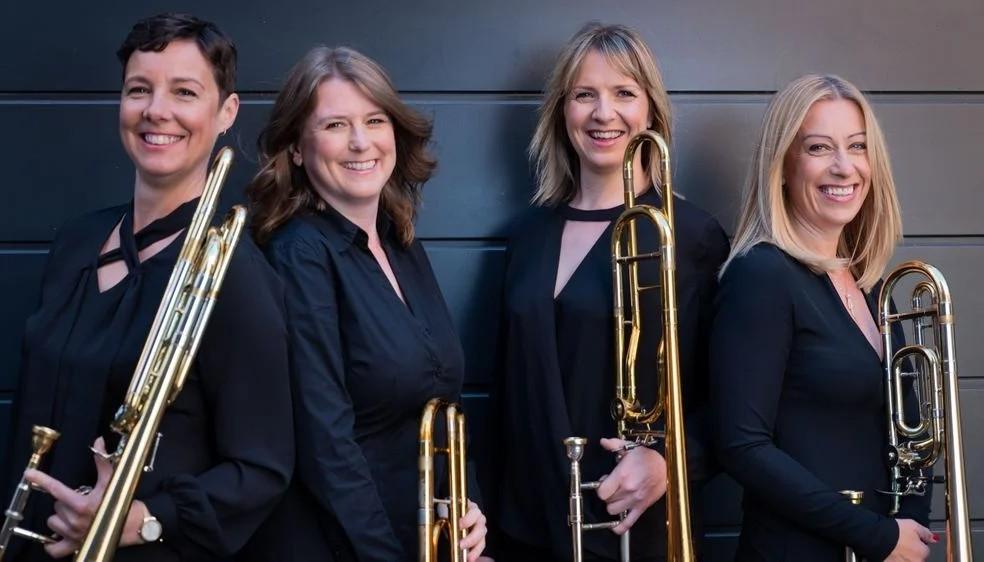
programme. Most importantly we are curating a project to get children to start learning brass more on that in the future!
In The Autumn 2009 edition of The Trombonist we celebrated Bones Apart’s 10th anniversary with some quick-fire questions. How have the answers changed fifteen years on?
Most difficult concert/piece?
HELEN VOLLAM: Glinka’s Overture to Ruslan and Ludmila – after arriving with minutes to spare from a nightmare journey! Was much too harrowing to programme it again after that!
JAYNE MURRILL: They are all difficult!
SARAH WILLIAMS: Each piece presents its own difficulties, playing in the context of a two-set performance usually gives the biggest challenge.
Favourite piece/arrangement/commission?
HV: Jason Carr Poem Unlimited and Dan Jenkins Señoras
JM: Jason Carr Poem Unlimited
BS: Christian Lindberg Vivencies
SW: Currently the Camilla di Rossi Alessio Suite, but it changes every day.
Most memorable performance?
SW: In the early days we did a gig in Lancashire where I had to play with the brass band, big band, BATQ set and dress up as a nun!
BS: We performed a joint concert with Christian Lindberg at the Wigmore Hall in 2005. At the time I didn’t realise quite what an achievement this was, not just for a trombone quartet but for any chamber group. Lindberg also composed a piece for us entitled Vivencies, which we played in the concert. A very memorable one for me.
HV: 4th July concert with a US Marine band in the USA. Also performing in a massed ensemble with young
brass players in a workshop in Cheddar – the look on their faces when we got to the end of the piece was so inspiring!
JM: My first ever Bones Apart performance was billed as background music. It was in St James’s Palace, and we were definitely not in the background. It was a terrifying gig, in front of a star audience!
Education is an important part of Bones Apart’s work, what advice would you give to young trombonists?
HV: Explore every style of music you can think of; the possibilities are endless!
BS: Yes, I agree with Helen, listen, listen, listen, and find the music you love.
JM: Practice hard and enjoy yourself – music is wonderful.
SW: Always listen, be aware of your place in the music –respond and adapt.
Finally, what does Bones Apart mean to you?
HV: Fun, music, friendship.
JM: Music making of the highest order with great musicians and friends.
SW: The versatility of technique and repertoire that the quartet has, coupled with working with three amazing players who are also some of the best humans on earth.
BS: I have so many fond memories from over the years; it was a huge part of my life at the RNCM and still is ever since graduating (a very long time ago!). I’ve had so many experiences I would not have had if it wasn’t for the quartet. I’m eternally grateful to all the members, past and present for continually inspiring me, for all the fantastic musical experiences I’ve had and for all the ones I will undoubtedly have in the future.
Keep up to date with Bones Apart via their website, Facebook, Instagram and YouTube ◆
BY SIMON WILLS
In May, Simon Wills was a featured artist at the ITA’s 2024 International Trombone Festival in Fort Worth, Texas. He reflects on the experience.
An improbably thin young man in a cowboy hat was trying to persuade a large instrument with a great many valves and extra pipes to play very low indeed; probably lower than the laws of physics would allow. Seeing me, he broke off briefly, gave a courtly bow – and resumed the struggle. Others, undaunted by the thirty-nine degree heat, filled the morning air with the works of Emory B. Remington and other luminaries of the warm-up. Inside, the air conditioning felt like salvation, and as I made my way around a forest of about three hundred trombone cases by the door, my phone dinged. An SMS: Just arrived safely. Very Grateful. 16 hours in the car, 950 miles. The ITA had flown me out a few days early to acclimatise, so the thunderstorms, giant hailstones and the tornadoes across Alabama hadn’t impeded me. The following day, most flights across the Midwest were cancelled but Doug Yeo drove down overnight from Chicago. When he announced his plan, I wondered if it was worth so much trouble. I have to admit it was.
This was my first ITA festival. I had usually been too many time zones away or just sick of travel when they were on, but those weren’t my only reasons. So often trombone events become exercises in hagiography or re-examinations of the same old pieces. To be honest, I had also formed a slightly unfair impression that these occasions were international in the same way that the World Series involves the whole world. This one was different: the host, Dave Begnoche – known to all as Doctor B – is a big man with a big heart and a lot of imagination. He wanted his festival to be about ideas, and to be the most inclusive ever held. He succeeded;
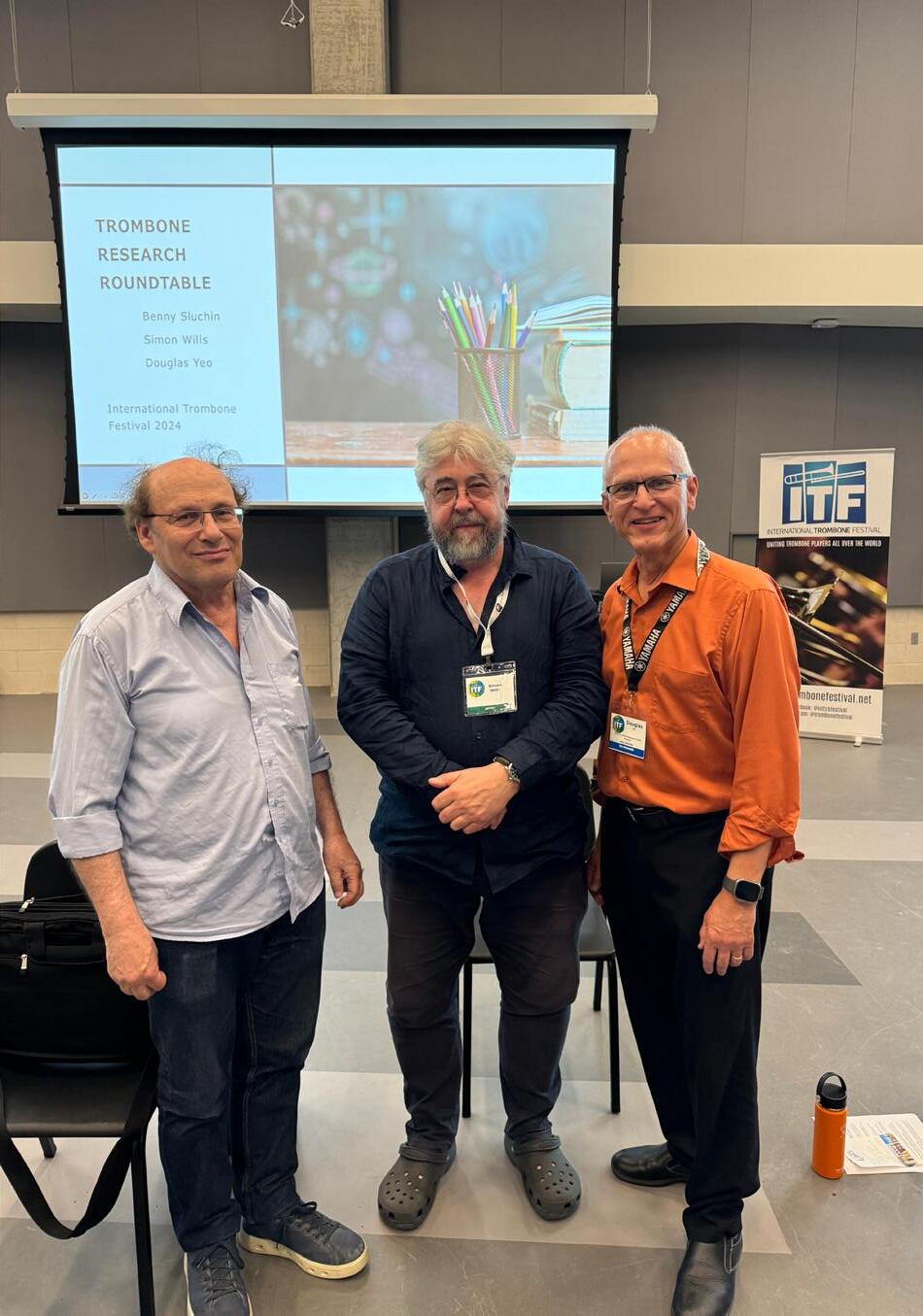
we had the International Women’s Trombone Choir, the all-female Monarch brass, there was discussion of Japanese repertoire, there were groups from Mexico, Costa Rica, Argentina, soloists from Japan and France –and one solitary Brit.
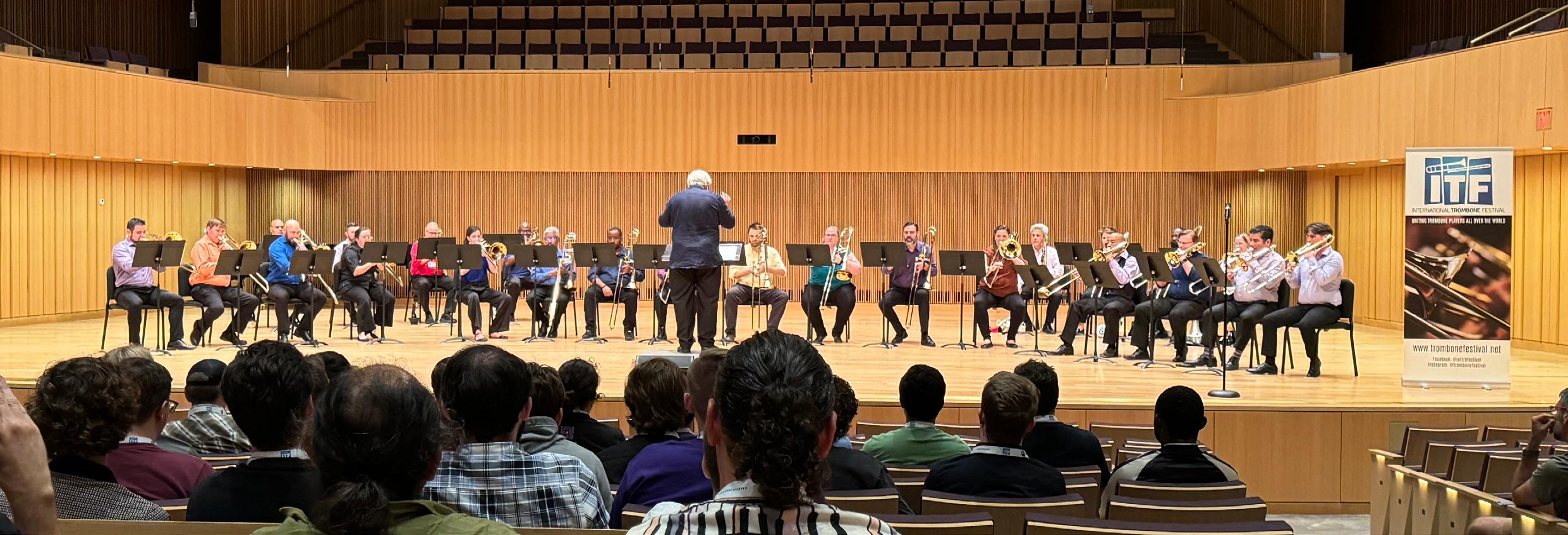
In four days there were one hundred and fifteen events, starting with group warmups at eight in the morning and going on into the night with jazz at the Rusty Nickel Icehouse. At any one time there were two or three things going on, and everywhere people were poring over their festival programmes deciding what to miss. Some tried to see a bit of everything, slipping in and out of halls in a constant, faintly dazed procession. I concentrated on what really excited me, and so I’m not going to write much about polished virtuosity. There was a generous amount of it on offer – Hillary Simms made a particularly strong impression – but you already know what polished virtuosity sounds like. 2024 is the centenary of J.J. Johnson’s birth so his works were much in evidence. I heard a lot of jazz and you’d have to be deaf (or dead) not to appreciate the energy and brilliance of Angel Subero, Wycliffe Gordon and others and if you don’t know the work of those gentlemen, they are all over YouTube. Go listen! Some of the events were serious, others were just fun: Trombones at the Movies combined film clips with arrangements for trombone choir of their scores. I decided not to mention the four contrabass trombones that we used on the soundtrack for Gladiator. They would have thought it a very skimpy total.
I had two main jobs. The first was the research seminar, which I shared with Benny Sluchin and Douglas Yeo. We concentrated more on directions and methods of research than our own preoccupations, though I did swerve into a consideration of the malodorous behaviour of some Georgian trombonists. Benny’s answer to the question ‘why do you research?’ was magnificent: ‘I always wanted to know more’ and his description of the hard work that goes into knowing more made quite a few people think. Doug and I are both exasperated by the incuriosity that afflicts the trombone world: even hackneyed works like the David
or Deux Danses have back stories that will improve the way they are played – but are never discussed. I fret that old archives are taken at face value because they are old, and I hope I managed to convince people that something written in copperplate on old paper can be just as unreliable as a meme on Facebook! Ours wasn’t the only research session. Somehow perfectly fresh from his thousand mile drive, Doug gave a pitch-perfect account of the life of Joannès Rochut and Ron Barron gave a talk on the Saint-Saëns Cavatine. He started it with a barnstorming performance of the piece, with quite the loudest last note I have ever heard, proving once again that there is plenty of life left in us old dogs.
On the same day, Benny spoke about the AI system Somax 2. He sees AI not as a threat or a monster but as just another invention that, in his words, functions as ‘a collaborator that assists humans rather than merely serving as a repository of answers’. His recital, given with Mikhail Malt from IRCAM, was of John Cage’s Solo for Sliding Trombone in a ‘duet’ with the technology. I don’t think we should fear this invention. It’s an aid to creative thought; the ways in which the machine reacts make new demands of the player and Benny seemed able to lead the technology then bounce off its reactions. We will be seeing a lot of this in the future.
My other job was to conduct the Cramer Choir, an ensemble of players who hold university teaching posts. We rehearsed every day, with players running in from recitals and lectures to play a bit of octet, disappearing off to the next thing the moment we finished. We opened our concert with Orage by Eric Crees, a brooding picture of a storm in southern France, and closed with David Wilborn’s beautiful Reflection and Celebration. The middle pieces were premières.
Dave Slonakar may not be a name to you, but if you have seen Night at the Museum or the later Indiana Jones movies, you know his work; he is an orchestrator

in Hollywood. He started out years ago as a trombone player and now has returned to the dark side of the Force to compose some very fine trombone music. His Dichotomy for octet with solo tenor and bass trombones is, as you would expect from someone in his line of work, admirably clear, strongly built and direct in its appeal. The soloists were Alex Iles, who amongst many other things is the first trombone at the Hollywood Bowl and Angel Subero, a Venezuelan virtuoso working on the East coast of the USA. Dr. B had suggested including an old piece of mine, Tinguely’s Fountain, but it is already played an awful lot and since I hadn’t written anything for trombone choir for a long time, I knocked out a thing called One is Down. As it was a piece for a special occasion, I made it personal. The title refers to Dr. B telling a conductor to remember that one is down – and I used his name as an architectural and thematic device.
It prompted some interesting harmony as well as providing a bit of structural DNA, which is needed in a long span like this. It is for 24 solo players, organised in five choirs: a central octet, two quartets laden with mutes, four bass trombones and a ‘celestial choir’ of four altos. This enabled abrupt changes of colour; an instantaneous switch from harmon to bucket, cup to straight and thence to open is startling for the audience and helps a lot with the most intractable problem in writing for trombone choir; the issue of foreground and background material. Second violins with noodling semiquavers will readily fade into the background; brass instruments, especially trombones, tend to do the opposite. Being able to ‘orchestrate’ with trombones was not just an interesting thing to do, it gave me some control over the prominence or otherwise of different ideas. It’s a lively piece and at one point I suggested that instead of trying to play it too prettily, the performers might try to locate their inner Yosemite Sam. Like any good cultural reference, it got results!
I wish there was a UK equivalent of the composition workshop that ran through the festival. There were established composers tutoring, things got played, discussed, changed and a lot of very good ideas were exchanged. Kevin Day, one of the tutors, had a première with the Fort Worth Symphony during the Festival – a double concerto for piano and trombone with orchestra
which deserves a lot of exposure. So often in new pieces the same rookie errors get repeated and this workshop was a very good model for improving the standard of writing. I’m going to try and start a trombone writing class at the Guildhall but if it was going on all over the place we would get some good new repertoire – and heaven knows we need it.
I don’t think I heard a single deconstruction of embouchure or breathing the whole time I was there. It used to be common, but the new generation of Americans have got ahead of us in realising that overdescriptive, over-technical teaching methods don’t work. Seeing everything led by musical ideas was a delight. This applied at every level of ability. A gentleman called Joseph Jefferson presented a jazz group of very young players: I don’t suppose any of the parts were much harder than Grade IV, but the style and ensemble were spot on. This was a real virtuosity of nuance. I wonder what those young players will be doing in ten years’ time.
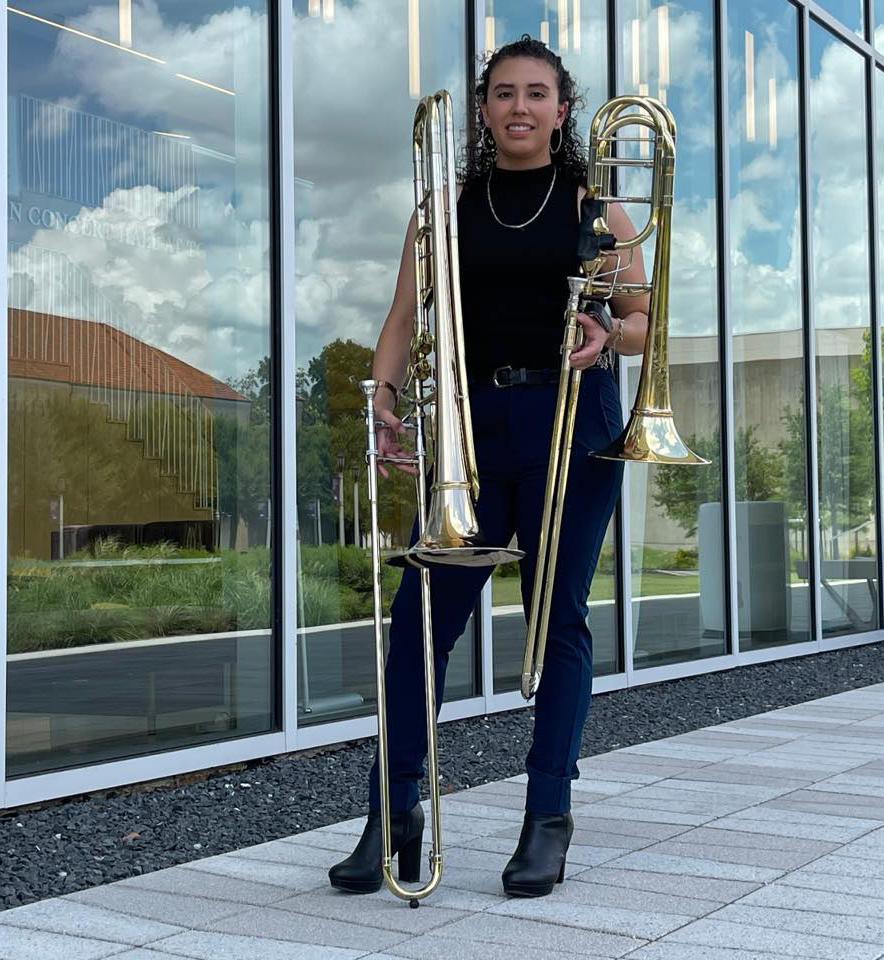
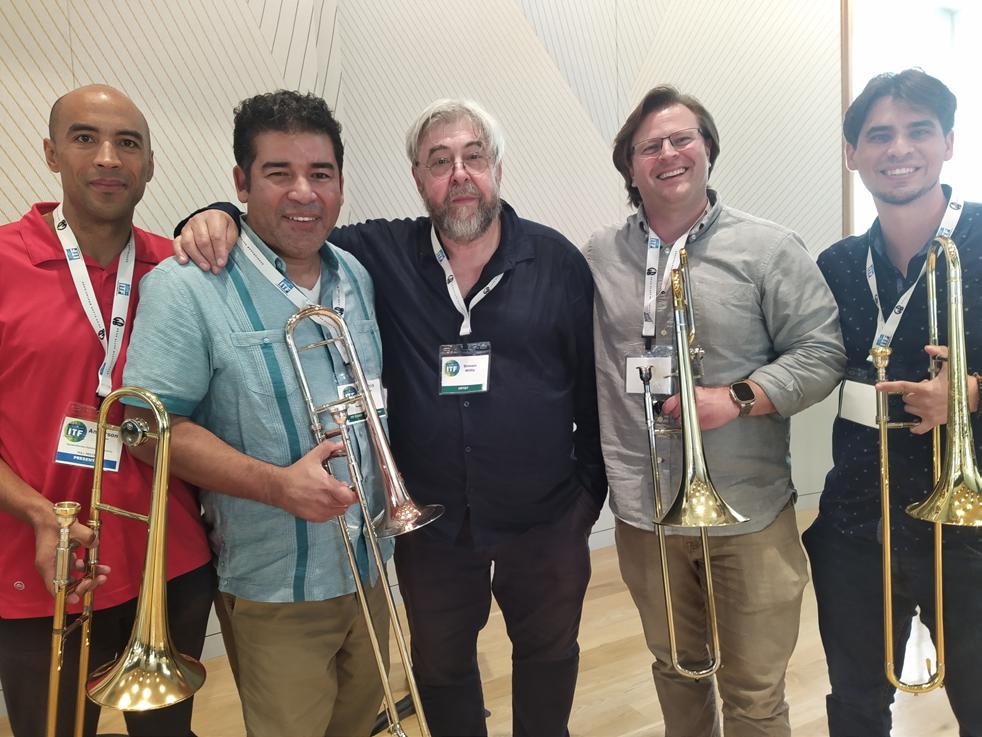
There were many moving moments, many of them from the youth programme. For me, the most emotionally charged presentation was a recital given by the bass trombone player Jeanette Velasco called Ni de Aquí, Ni de Allá (Neither from Here nor from There) The backbone of it was a narration of her grandmother’s painful experiences as a Mexican immigrant to the USA, interspersed and sometimes combined with music by Antonio Salvador (whose Sonatina Mexicana really should be better known), Miguel Jimenez, Abby Pinkerton, Neil Anderson-Himmelspach and Edna Alejandra Longoria. Spoken words often make uncomfortable bedfellows with instrumental music but this really worked and left a big audience in something like shock. It made for tough listening, but it made us think, and I can’t conceive of higher praise than that.
In a week of powerful sensations, the Viento Sur Trombones stood out for me. It is an unusual quartet, two basses and two tenors – though all four players pass between the different registers as easily as breathing. The daredevil energy of the performance was like nothing I have heard anywhere in the world. Of course they played some Piazzola, but in the other Argentine works that they performed I found myself musing that theirs was the country that produced Roberto Gerhard, and Jorge Luis Borges and this approach to the trombone seemed to have grown out of the same fantastical, dark culture. I’ve done a little work on a trombone quartet since the Festival, and it seems that this one evening has altered the way I think for the medium. It was worth braving the journey, the heat and the tornadoes just for that.
I hope I haven’t made it sound too serious. It was fun, full of interesting conversations and simple good company. I learned a lot of new things and found myself thinking differently about things I already knew. I was already edging my way towards the idea that I should compose more for my own instrument before I lose my marbles completely. The ITF convinced me that this is a
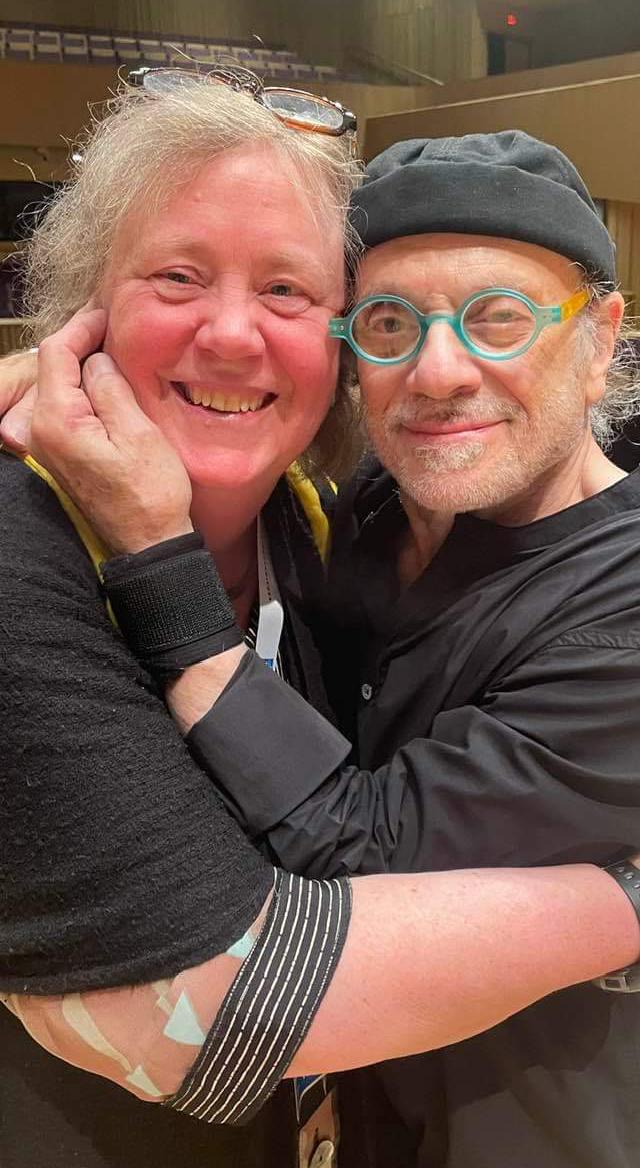
good idea! And I need to spend more time in S America …
The last recital was given by Dave Taylor, and as always it was a demonstration of a creative process in action. His version of Goethe’s Erlkönig for himself as reciter with bass trombone commentary was hypnotic. At dinner afterwards, he mentioned that he would be turning eighty the following week. Like I said, there is plenty of life left in us old dogs! As so often with a time of frantic activity, the end – and ensuing quiet – came as a shock, and I spent my last morning in a daze, at the Kimbell art museum. It has a portrait of Jakob Obrecht, a timely reminder to us modern composers of our insignificance beside the real masters. Then an Uber to the airport. The day after I got home, I was back at the orchestral coalface, and by a pleasing quirk of symmetry it was an American programme. A few minutes into the rehearsal, a colleague asked ‘have you had a lot of coffee this morning?’ I suppose I was a little brasher than usual, but it wasn’t caffeine or jetlag – more a healthy implant of Texan energy! ◆
BY ADRIAN FRANCE

In Autumn 2024, The Concert Trombone Quartette (CTQ), of which I am the director, will celebrate the 200th anniversary of the birth of famed Austrian lateRomantic composer, Anton Bruckner (1824–1896) with three exciting Midlands based historically informed performances in collaboration with St Mary’s Choir, Nottingham, Leicestershire Chorale and The Choir of Leicester Cathedral.
The late-Romantic era bore witness to a vast array of repertoire using trombones, from the famed symphonies of Mahler, Strauss, Brahms and Bruckner – notably, the famous trombone solo in Mahler’s epic Third Symphony, premièred in its entirety in 1902 – to operas, tone-poems, masses, motets, sacred works, Aequale, concertos and concertinos.
Bruckner’s own relationship with the trombone clearly endured, given his wider-ranging use of it compared with his contemporaries, not only in his nine ‘main’ symphonies, but also in sacred works and motets scored for trombones and voices, following the historical Austrian tradition. Some of these sacred works were also dedicated to his family members and close friends ‘In Memoriam’, reinforcing the long-standing historical link between the trombone and funeral practices.
As a general observation, Bruckner’s works, sacred, secular and symphonic, were undoubtably performed in their premières on either valve trombones, usually 2 tenors in Bb and 1 bass in F or on slide trombones, usually 2 tenors in Bb and 1 or 2 tenor/basses in Bb
with F attachments. Scholarly research by Bernhard Rainer outlines Bruckner’s full catalogue of works using trombones with evidence to the probability of which instruments were being used at the time. Some works used military instrumentalists suggesting the high probability of valve trombones being employed. Symphonically, premières were given by The Vienna Philharmonic, or musicians of the Court Opera Orchestra, Vienna Concertverein Orchestra, latterly, the Vienna Symphony Orchestra and The Gewandhaus Orchestra with evidence suggesting valves, not slides, were used in his earlier symphonies – all certainly worth a consideration for historical performance practice.
CTQ’s Autumn performances will be in three stages, focusing on Bruckner’s sacred Psalms, Motets, Requiem
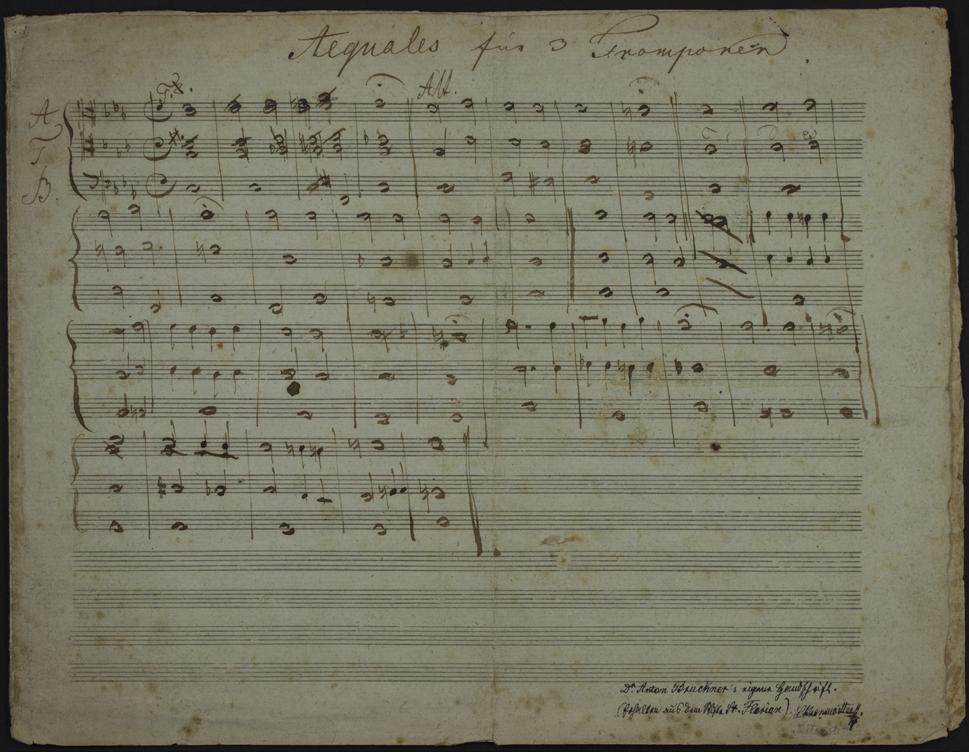
and iconic ‘Linz tradition’ Aequale, but all being performed in differing formants. Our aim is to celebrate the versatility of Bruckner’s writing for trombone, as well as raise to awareness of rare works for trombone and choir by giving UK premières of compositions by his lesser-known contemporary composers, who remain almost completely unknown to this day.
Interestingly, two of these composers, Adolf Müller and Ignaz Seyfried, both pallbearers at the funeral service of Ludwig van Beethoven (1827), subsequently went on to write their own Aequale for trombones in 1830 and 1834/7 respectively. Presumably they were influenced by the great master’s own Aequale, which were performed during Beethoven’s funeral service. Seyfried in particular was tasked with setting the Miserere text to be sung to Aequale Nos 1 & 3 Furthermore, Beethoven’s Aequale were also performed at Seyfried’s own funeral in 1841.
Another significant link saw Bruckner being bestowed with the task of placing Beethoven’s skull into the casket upon his final internment; an honour which would stay with him for the rest of his life.
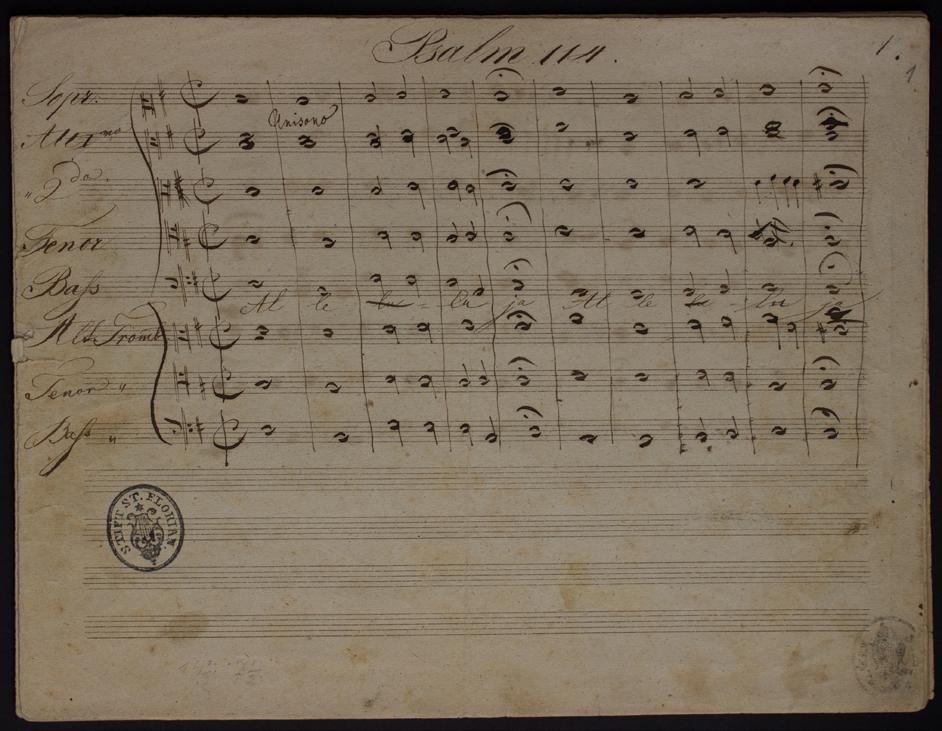
PAGE FROM BRUCKNER PSALM 114, WAB 36 (AUTOGRAPH MANUSCRIPT – STIFT ST. FLORIAN (CRSA), BRUCKNER-ARCHIV, A-SF19-4B).
Concert one – Saturday, 12 October, alongside St Mary’s Choir, Nottingham will feature a variety of sacred works including a performance of Bruckner’s Requiem in D-Moll (1849), his first large-scale masterpiece, written during his time as a teacher and organist at St Florian Monastery, Austria, a place of huge significance to Bruckner, who considered it his spiritual home. On the death of his father at the age of 13, his mother secured a place for him as a chorister in the church choir. She too was in the choir and he went on to receive further instruction there in singing, violin and organ. Leaving St Florian at the age of 17 to train as a teacher, Bruckner returned there in 1845 to take up a teaching position in one of the village schools, before becoming organist at the Monastery in 1847, the same year that he wrote his two Aequale. He is buried within St Florian Monastery, beneath the organ.
Choir of St Mary the Virgin –Bruckner 200th Anniversary.
St Mary’s Church, High Pavement, Nottingham. NG1 1HN.
Tickets available here
Concert two – Saturday, 2 November. CTQ team up with Leicestershire Chorale in a truly special event where CTQ will also host a pre-concert workshop on the day, open to trombonists from Leicestershire, my home county. This will take the form of a mini-introduction, demonstration and brief Power-Point history of the trombone, followed by participants having a unique opportunity to try some of CTQ’s original trombones and to perform in one or two pieces in the evening concert in a side-by-side format.
Leicestershire Chorale – Bruckner 200th
Anniversary educational workshop and concert
St Andrew’s Church, Jarrom St, Leicester. LE2 7DH.
Tickets available here
Concert three – Sunday, 3 November sees CTQ join forces with the choir of Leicester Cathedral in another unique performance, this time with excerpts from Bruckner’s E Minor Mass in a liturgical setting, alongside motets and a selection of Aequale as antiphons.
Choir of Leicester Cathedral – All Saints Service Leicester Cathedral, 2 Peacock Lane, Leicester LE1 5PZ.
Further details here
These unique concerts will feature original Romantic style trombones from the time of Bruckner, in historically informed performances, offering a unique sound scape and timbre that Bruckner himself would have been familiar with. These very trombones were used to perform Bruckner’s motet, Ecce Sacerdos during the Coronation of King Charles III, May 2023, courtesy of myself and The Concert Trombone Quartette. To find out more about The Concert Trombone Quartette please visit the ensemble’s website ◆
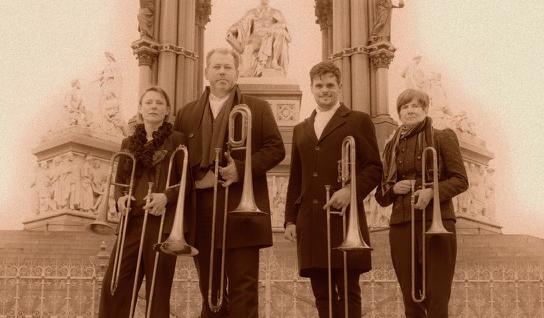
BY PETER CHESTER
Nationalistic flag waving is not something I usually indulge in. Given the power of good music-making to bring people together in a common appreciation of talent, it is not something to be encouraged, especially in the friendly world of trombone players. That said, to see such players as Peter Moore, Emily White and Dennis Rollins, all stalwarts of the British trombone world (and Society events) given starring roles at the Slide Factory Trombone Festival, alongside the likes of Joe Alessi, Marshall Gilkes, Jörgen van Rijen, Brandt Attema, Eijiro Nakagawa, and Sasha Romero, as well as the great Dutch group, New Trombone Collective (NTC), did generate just a little pride and certainly attested to their quality and international standing. Each made their distinctive mark on a Festival that has always showcased the best and most innovative trombone-based music-making to be found anywhere.
So, what did our star players get up to? To start with Dennis Rollins and the Velocity Trio were given headline billing for the Saturday Jazz night and Dennis’s big smooth sound, brilliantly supported by Liam Dunachie (organ) and Pedro Segundo (percussion) was very well-received. Emily White of course offered something in great contrast and very special, with a beautifully elegant recital on sackbut, accompanied by Kathryn Cok on the organ. The range of gentle and lively music from the 17th century was interspersed with contemporary pieces, most notably the poignant Spring in an unreal World, before she was joined on stage by the eight trombones of NTC, who simply provided a long gentle ‘drone’, a single held ‘A’ over four octaves, supporting Peter McCarthy’s O’r Galon for solo Sackbut and Drone. Very unusual, but nonetheless impressive.
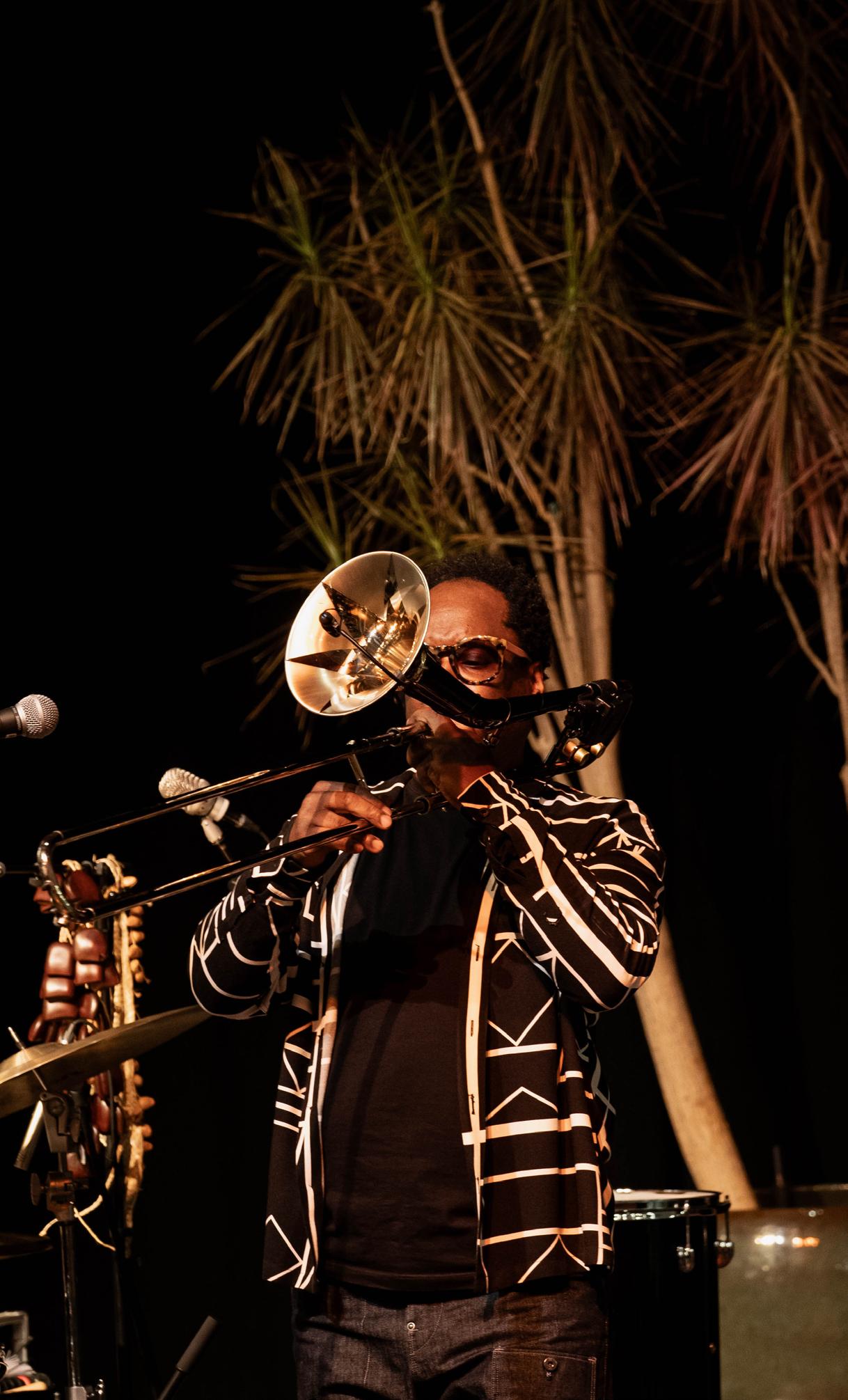
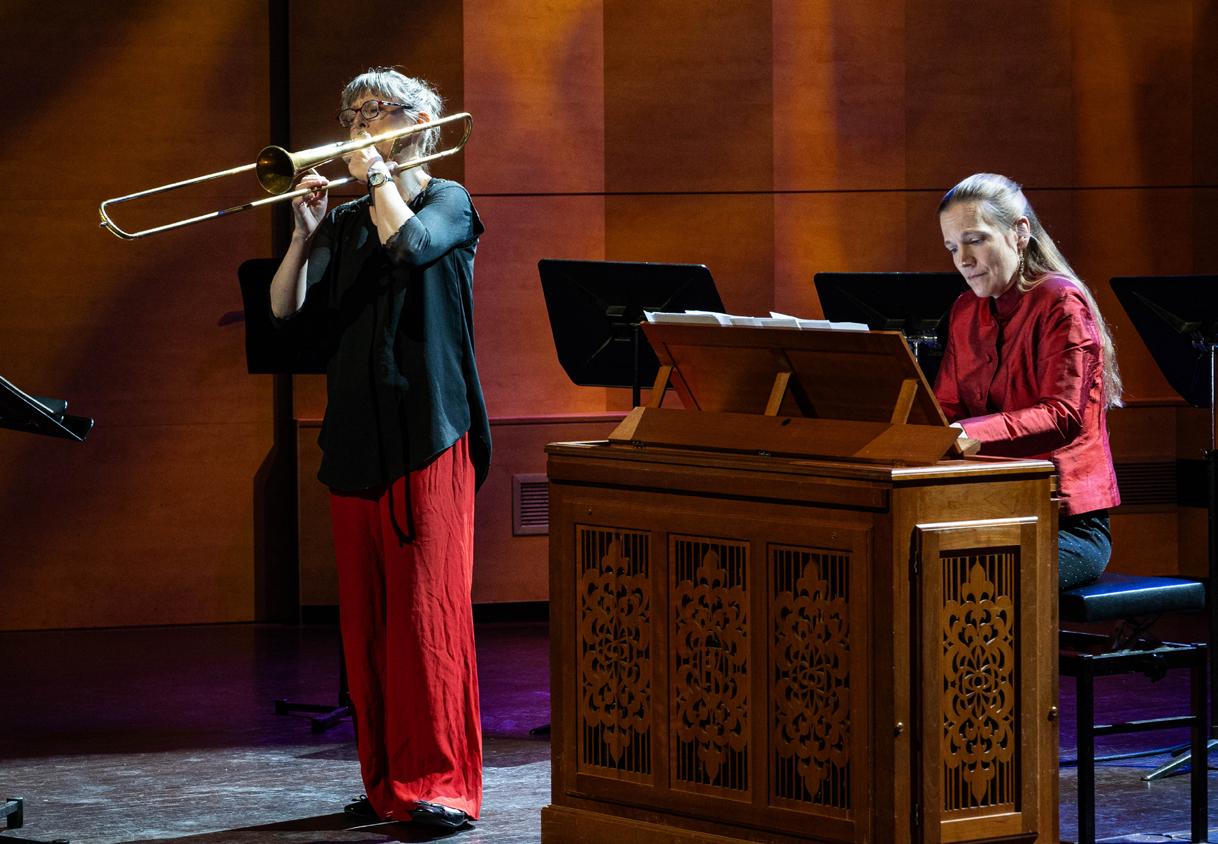
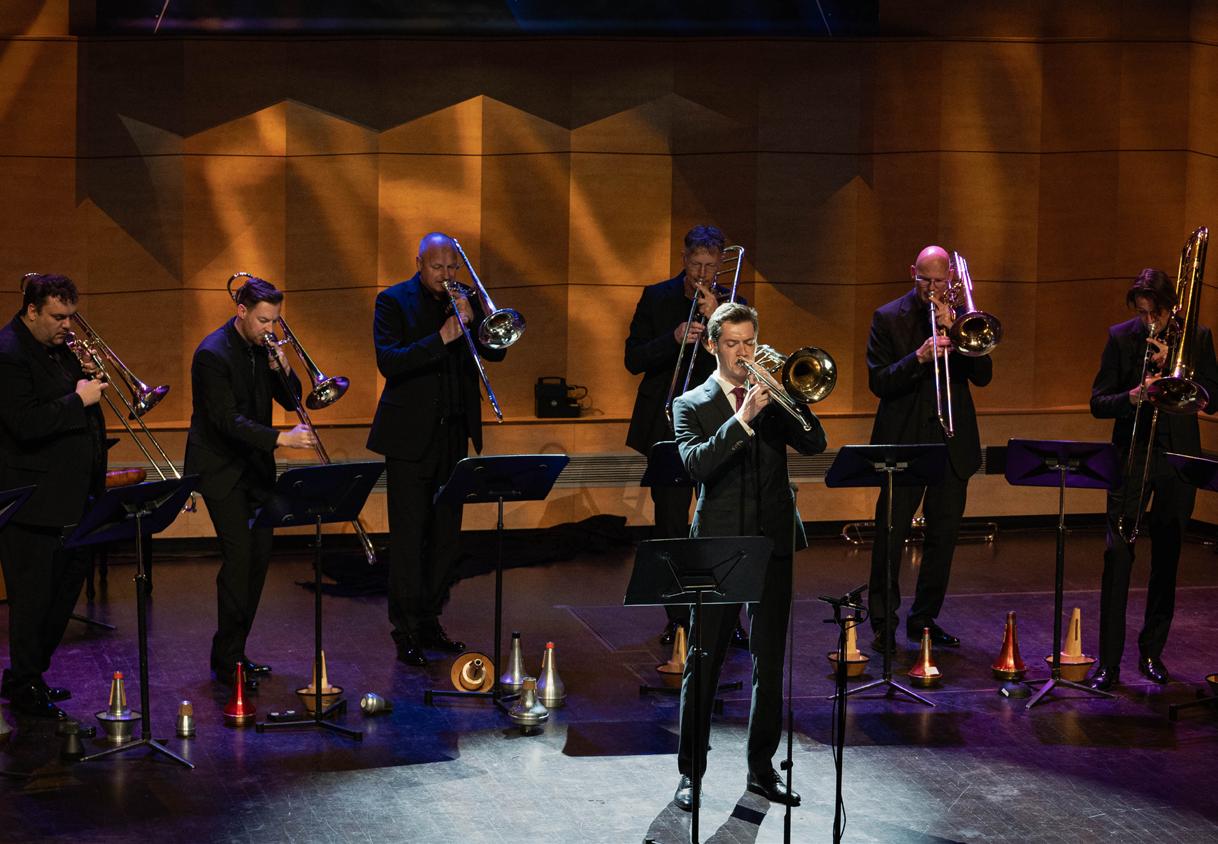
As for Peter Moore, he was there on day one, sharing an exciting recital with the Nympheas Quartet. Their recital covered a musical range, including a memorable rendition of Asturias by Albeniz.
Peter offered solos, both unaccompanied and with piano, including music by Parsichetti, Salzedo and Rachmaninov before joining the quartet for a couple of pieces. Peter’s smooth sound and flawless technique was as impressive as ever, and he was also invited to play in NTC’s Gala Concert on the Saturday night, which featured most of the international guests that were at the Festival. In that concert he played the Cogent Caprice by Tommy Pederson. Peter Moore fronting six trombones from the NTC was quite a sound.
NTC is a team of Dutch trombone players who were all students together some twenty years ago. All players are top-class professionals in various roles across Europe and this was their first Festival, the Slide Factory, as they call them, since Covid. Clearly, they are enthusiasts for all things trombone, and innovation and inclusivity have always been at the core of their work. Thus, we were treated to a number of première performances, most notably perhaps a brilliant new concerto called Shift, by Jimmy Lopez Bellido, given a stunning performance by Jörgen van Rijen and the Rotterdam Philharmonic. This had everything, melody, significant technical demands, imaginative effects and is certainly a major contribution to the repertoire. Jörgen van Rijen was also at the centre of innovative music of a different kind, leading a thoughtful event called Only Dead Fish drift with the Stream. This juxtaposed videos and specially composed music around contemporary themes such as environmental issues and racism.
Alongside the new music, there was innovation in performance approaches. For example, the teenagers of the Young Trombone Collective began their recital with a dance from South Africa, which turned into a clever
shout and response piece of trombone music.
For me, one highlight was the magical opening of the Gala Concert: a soprano, Elizabeth Herrington, gently singing Tota Pilchra Es, by Bruckner, accompanied first by four off-stage trombones, before being joined by all eight of the NTC. Such a pure sound, simple yet mesmerising, was a wonderful contrast to the sheer bravado and stunning techniques demonstrated in other parts of the concert, with Derek Bourgois’ Osteoblast, for example.
Over the three days we had recitals by groups large and small, as well as performances from distinguished international players. The Nympheas Quartet has already been mentioned, but there was a jazz group called Tinase who were joined by Marshall Gilkes, and the very impressive Bruckner Quartet. As their name would imply, their playing of Bruckner was impeccable, but they also did a neat line in Iron Maiden rock music – it worked! The Bruckner quartet recital was shared with Sasha Romero from New York, where she is the Principal Trombone of the Metropolitan Opera Orchestra. Alongside her own music inspired by her relationships and her experiences during the pandemic, she offered the lollipop of Arban’s Carnival of Venice, which had to be seen to be believed.
Other international guests included Polina Tarasenko, a young Ukrainian player who gave an effortless performance of Edgar Cosma’s very musical Trombone Concerto with the Marine Band of the Royal Netherlands Navy, as well as appearing at another recital, where she just had to give us Blues Bells of Scotland as an encore. Also appearing with the Navy Band was Rommert Groenhof, the newly appointed bass trombone of the Rotterdam Philharmonic, who gave a masterly performance of the 3rd movement of Vademecum by Wim Bex. The distinguished player and teacher from Hungary, György Gyivicsan, gave a very
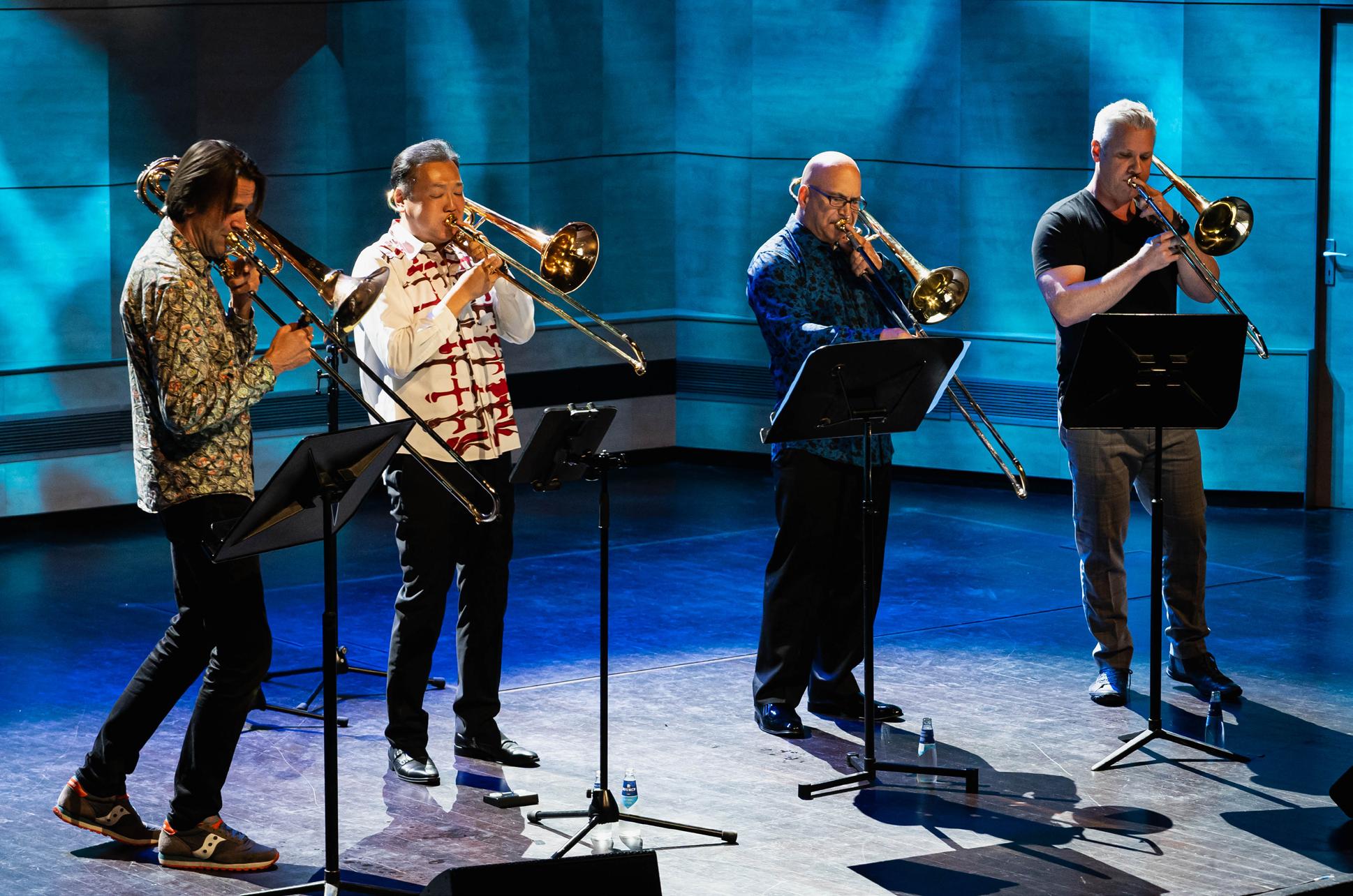
useful masterclass (‘remember all music-making is drama!’ and ‘play for the person on the back row!’) as well as showing his flawless technique in other recitals. However, I sense that many at the festival were there for one reason – the chance to hear a live performance by Slide Monsters, their first in Europe. Slide Monsters was the brainchild of Japanese jazz trombonist Eijiro Nakawaga, who had an idea in 2018 to create a trombone quartet that featured players from both the jazz and classical world. An initial conversation with Joseph Alessi of the New York Philharmonic led to an invitation to Marshall Gilkes and Brandt Attema to join the group, so there they are, Slide Monsters. Such talent together on one stage is almost impossible to conceive. Eijiro is a brilliantly creative player as well as composer; Marshall is considerably more than just the impossibly high notes that he is famed for; Joe has played almost everything in the trombone world and Brandt’s bass and contrabass playing is as rich and smooth as anything you will ever hear. Whether playing a jazz piece or something more in a classical ensemble style, the smooth and impeccable playing was central. Marshall Gilkes’ Cora, and Improvisation No. 1, written for Brandt Attema were outstanding. Joe Alessi’s improvisation on Body and Soul was illuminating to say the least and after two encores, the only way the group could end the concert was to parade out of the hall through the standing ovation, playing their final piece. A truly memorable concert
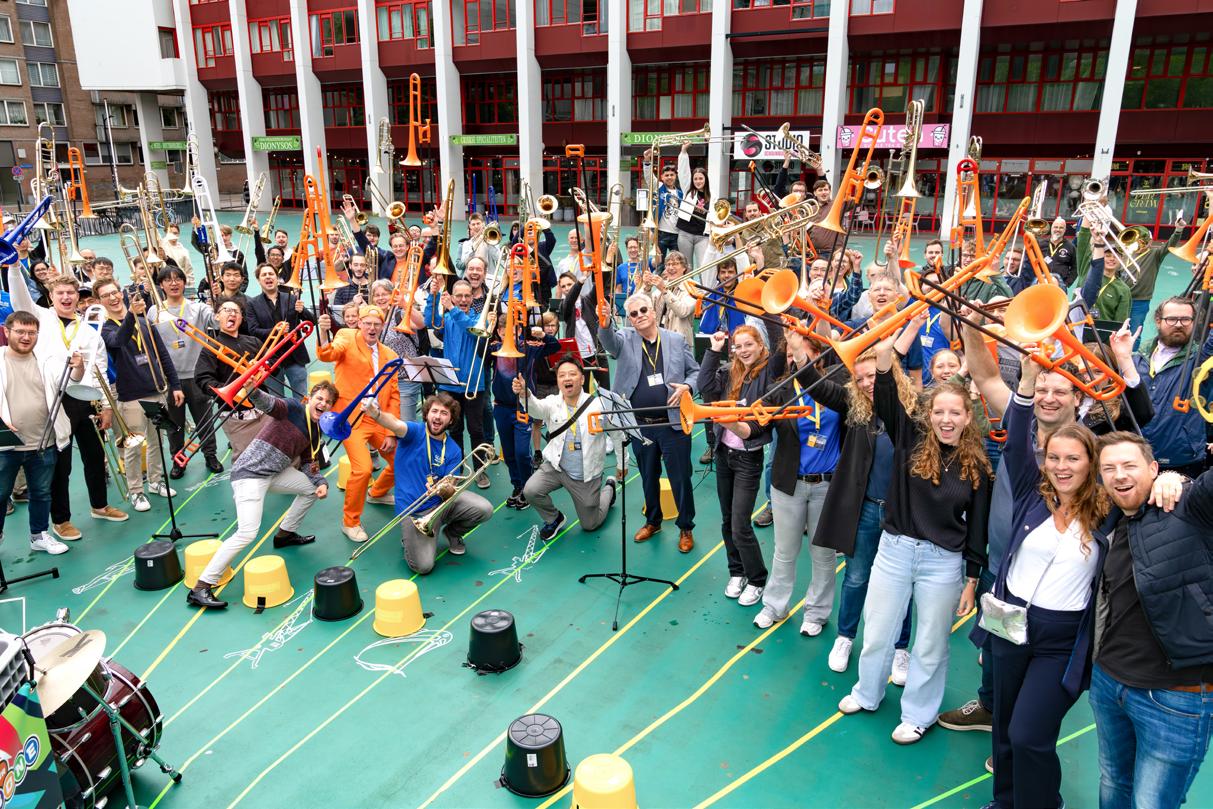
*dozens of orange pBones were used in a final outdoor massed blow for children and adults – what a sight! And sound!
By Alastair Warren
PETER MOORE
7.00pm, Saturday, 14 September
FRESHWATER, ISLE OF WIGHT
7.30pm, Monday 16 September
BARBICAN, LONDON
7.30pm, Saturday, 12 October
JENESES CENTRE, BOGNOR REGIS
7.45pm, Friday, 18 October USHER HALL, BELFAST
NICHOLAS ADEMA QUARTET

7.45pm, Friday, 27 September Chichester Jazz Club, Chichester
CAROL JARVIS
6.00pm, Saturday, 28 September Stantonbury Theatre, Milton Keynes
RORY INGHAM’S TROMBONE ASSEMBLY
7.30pm, Thursday, 3 October Tivoli Theatre, Wimborne
DENNIS ROLLINS
6.30pm, Thursday, 10 October Soul Mama, London
CONCERT TROMBONE QUARTETTE
7.30pm, Saturday, 12 October
St Mary’s Church, Nottingham
7.30pm, Saturday, 2 November
St Andrew’s Church, Leicester
10.30am, Sunday, 3 November Leicester Cathedral, Leicester
HELEN VOLLAM
1.15pm, Friday, 18 October RWCMD, Cardiff
GARETH BROWN
Grondahl Trombone Concerto, Wilmslow Symphony Orchestra
7.30, Saturday, 19 October Evans Theatre, Wilmslow
BLAIR SINCLAIR
Works for trombone and organ
1.00pm, Monday, 21 October Town Hall, Huddersfield
BRETT BAKER
3.00pm, Sunday, 27 October St Chad’s Church, Shrewsbury
BONE-AFIDE TROMBONE QUARTET
7.30pm, Thursday, 14 November Town Hall, Grimsby
3.00pm, Monday, 18 November Unitarian Meeting House, Bury St Edmunds
7.30pm, Tuesday, 3 December Town Hall, Chipping Sudbury
7.30pm, Friday, 6 December Outwood Academy, Scunthorpe
7.30pm, Tuesday, 10 December URC, Cockermouth
LAURA IMPALLOMENI QUINTET
8.00pm, Sunday, 17 November Richmond, London
QUINTET-A-TETE
Featuring Callum Au 8.00pm, Saturday, 23 November Civic Centre, Berkhamstead
PEDWAR BONES
1.00pm, Wednesday, 27 November Beulah URC, Cardiff
BONES APART
3.00pm, Sunday, 1 December St Mary’s Church, Yatton
DONAL BANNISTER
World première of Simon Wills Nora Barnacle Assumes Command, BBC National Orchestra of Wales
7.30pm, Thursday, 5 December Hoddinott Hall, Cardiff
MUSIC FOR TROMBONES, BASS CLARINETS & TUBAS
7.30pm, Sunday, 8 December Café Oto, London
Visit the BTS website for up-to-date events listings
As another triumphant summer of BBC Proms concerts draws to a close, so the UK’s orchestras look to start their 2024/25 seasons. Looking through the schedules for the Autumn there are many exciting and original programmes planned, alongside some old favourites. Several performances of Bruckner’s ninth, and final, symphony scheduled to round off his 200th anniversary year, though my pick is a rare opportunity to hear one of his earlier symphonies played on period instruments. Several outings for The Planets celebrate Holst’s 150th birthday.
With recent research conducted by the RPO showing 80% of adults interviewed wanted to experience an orchestral concert this year it is pleasing to see orchestras doing more and more to facilitate this, with numerous 3.00pm Sunday concerts, often featuring music from films, TV or video games, and 6pm rush hour concerts during the week offering more opportunity than ever before to hear some of the greatest music ever composed.
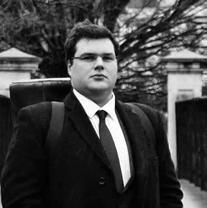
BY JOSH CIRTINA // PRINCIPAL BASS TROMBONE IN THE ROYAL PHILHARMONIC ORCHESTRA
WITH ALASTAIR WARREN
SYMPHONIC HIGHLIGHTS
THE PLANETS – BBC PHILHARMONIC ORCHESTRA
7.30pm, Saturday, 21 September Bridgewater Hall, Manchester
Led by Chief Conductor John Storgårds, the BBC PO open their 2024/25 season with Gustav Holst’s Planets Suite, in his 150th anniversary year, paired with GraceEvangeline Mason’s ABLAZE THE MOON. Described as ‘an amorous nocturne’, the BBC PO gave its première at the BBC Proms in 2023. Also on the programme is Beethoven’s dramatic Piano Concerto No. 3, performed by Paul Lewis
BRUCKNER: SYMPHONY NO. 5
– ORCHESTRA OF THE AGE OF ENLIGHTENMENT
7.00pm, Sunday, 13 October
Queen Elizabeth Hall, London
The OAE writes, ‘Considered by many to be his symphonic masterpiece, Bruckner’s Symphony No. 5 represents the culmination of the first period of his time in Vienna. He had relocated to the city in 1868 from Linz, where he had been the organist at the ‘Old’ Cathedral and produced many of his fine choral works. Curiously, Bruckner never heard this symphony performed by an orchestra. This performance, using instruments of the type that would have been familiar in Vienna at the time, gives a rare chance to hear the symphony its composer imagined, continuing a blossoming relationship between conductor Adam Fischer and the OAE.’
SIBELIUS SEVEN & NORDIC MUSIC DAYS
– ROYAL SCOTTISH NATIONAL ORCHESTRA
7.30pm, Friday, 1 November Usher Hall, Edinburgh
7.30pm, Saturday, 2 November
Royal Concert Hall, Glasgow
Two chances to catch an imaginative programme exploring music from across the North. In just 22 minutes, Sibelius’ Seventh Symphony sums up his entire symphonic journey in one extraordinarily intense movement, with the trombone playing a central role in the drama; Errollyn Wallen’s Northen Lights paints the skies as seen from a Scottish lighthouse; and star violinist Isabelle Faust soars like a bird across a Nordic seascape in Rune Glerup’s concerto About Light and Lightness Also on the programme are Bent Sørensen’s Evening Land and Aileen Sweeney’s Glisk. Performing alongside the RSNO will be the young musicians of Big Noise Wester Hailes and Big Noise Govanhill, all conducted by Thomas Søndergård.
PRESENTING: WORLDS OF FANTASY
– ULSTER ORCHESTRA
3.00pm, Sunday, 3 November Waterfront Hall – Belfast
This popular concert provides the perfect escapism on a Sunday afternoon, guiding you through some of the most exhilarating music from the worlds of fantasy that have been so impactful in creating atmosphere and excitement in cinema, anime, television or gaming. Hear music from Lord of the Rings, Wonder Woman, Halo, Top Gun: Maverick, Game of Thrones and many more!
MAHLER SYMPHONY NO. 9 – PHILHARMONIA
7.30pm, Thursday, 21 November Royal Festival Hall, London
Revered conductor Herbert Blomstedt, still sharing the delight he finds in music-making in his late nineties, conducts Mahler’s Symphony No. 9. The last work Mahler completed, his Ninth is a work of overwhelming emotional impact. In almost 90 minutes, it spans doubt and defiance; grief and hope; climaxes of devastating power, and a hushed ending that can make an enthralled audience of thousands almost forget to breathe. True virtuoso of the violin Leonidas Kavakos performs Mozart’s Violin Concerto no. 4.
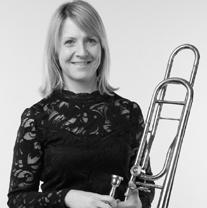
STRAUSS’ HORN CONCERTO NO.2
– LONDON PHILHARMONIC ORCHESTRA
3.00pm, Sunday, December. Congress Theatre, Eastbourne Decried as impossible to play when first composed, internationally acclaimed young British horn player Ben Goldscheider proves Strauss’s playful Horn Concerto No. 2 is not just possible, it’s fun. Dvořák’s Eighth Symphony was once known as his ‘English’ symphony. Yet its lilting melodies and exuberant dance rhythms could hardly be more Czech. In the hands of conductor Valentina Peleggi it’s a gloriously tuneful climax to a concert that begins with Mozart’s comedy overture to The Marriage of Figaro.
BY BECKY SMITH // PRINCIPAL TROMBONE AT THE ENGLISH NATIONAL OPERA
If you do one thing this Autumn, make it a trip to the opera! If you’ve never been before I am certain you will be surprised, you may fall completely in love with the art form, but I am sure you will enjoy some, if not all of it. This does depend on the show you decide to watch, but there is a whole variety on offer across the UK, and I urge you to try it out before the UK becomes a desert for opera. With only two full time opera companies in the whole of the UK, down from five around twelve years ago, we are in worrying times.
Opera North, one of those two full time companies, is putting on two of my favourite shows. The first is THE MAGIC FLUTE by Mozart. Described by Opera North as ‘the ideal introduction to opera for everyone, packed with fantasy, romance and daring. James Brining’s production, Colin Richmond’s shape-shifting design and Mozart’s musical fireworks make for a dizzying, magical ride through a world where nothing is quite as it first appears.’ The company is also performing A MIDSUMMER NIGHT’S DREAM , by Benjamin Britten. A really fun opera to watch and listen to, if you missed the run at Garsington this year then now is your chance to see it.

There is a good selection of Puccini being performed across the country. Welsh National Opera are performing the triple bill IL TRITTICO , back home at English National Opera we are performing one of those one-act operas, SUOR ANGELICA , and also LA BOHÈME , a great one for opera newbies! The Royal Opera House are performing La Bohème, but an even more musically dramatic show is TOSCA . If I had to choose, I’d say go for Tosca, the introduction alone is worth going for!
Finally, a family friendly show with some gorgeous music is Engelbert Humperdinck’s HANSEL AND GRETEL , on at the Royal Opera House over Christmas. It will get you in that Christmas spirit if you weren’t feeling it before.
Whatever you choose, please keep supporting opera in the UK. We are a struggling artform, and the only news currently seems to be that of funding cuts, leading to job cuts and companies going part time. Doing something to save money when it destroys the very product that you are trying to create is self-defeating. We need to try to stop this happening before it is too late. ◆

